This decadent cookies and cream cake is made with Oreo buttercream sandwiched between layers of moist chocolate cake and wrapped up in more Oreo buttercream, topped with pretty swirls and Oreo cookies.
This recipe makes an 8 inch cake with 2, 3 or 4 layers. Halve the recipe to make a 6 inch cake.
Ingredients
For the cake
2 1/2 cups (625ml) hot water
1 1/4 cups (125g) unsweetened cocoa powder
2 1/2 sticks (1 1/4 cups or 280g) unsalted butter*
2 2/3 cups + 1/4 cup (583g) sugar
5 eggs
2 1/2 teaspoons vanilla extract
3 1/3 cups (400g) all purpose flour
1/2 teaspoon baking powder
2 1/2 teaspoons baking soda (bicarbonate of soda)
1/2 teaspoon salt
For the filling, frosting, and decorations:
2 1/2 cups (565g or 20oz or 5 sticks of 4oz each) unsalted butter*
907g or 32oz (about 7 cups) powdered sugar
1/2 teaspoon salt
1/2 tablespoon vanilla extract
2-3 tablespoons cream or milk
28 Oreos
*You can use salted butter instead for the cake and/or buttercream- just omit the salt in the recipe
Method
Start by baking the chocolate cake layers. In a bowl, whisk together hot water and cocoa powder until the cocoa powder has dissolved. Set aside to come to room temperature.
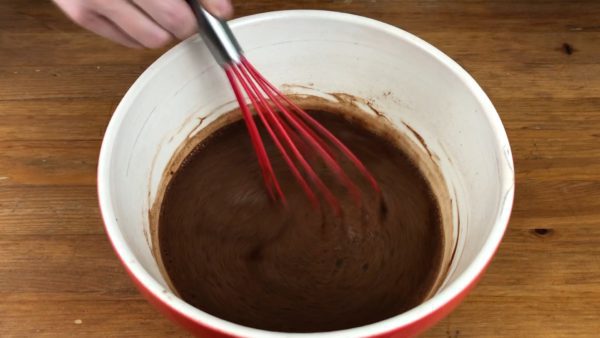
In a mixer with a beater attachment, mix butter with sugar on medium speed until pale and creamy, about 2 minutes. Scrape down to the bottom of the bowl once during mixing to make sure no butter is stuck at the bottom. Add eggs 2 at a time, mixing on the lowest speed after each addition until incorporated, about 30 seconds. Add vanilla and mix on lowest speed for about 30 seconds to combine.
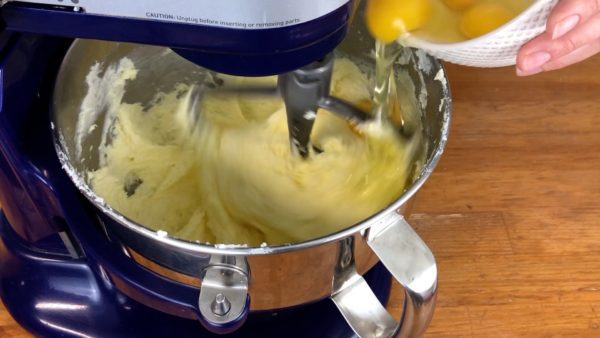
In a bowl, sift flour, baking soda and baking powder. Add half of the flour mixture to the mixing bowl and mix on lowest speed to incorporate. Add half of the cocoa mixture to the mixing bowl and mix on lowest speed to incorporate. Repeat with remaining flour mixture and then remaining cocoa powder mixture.
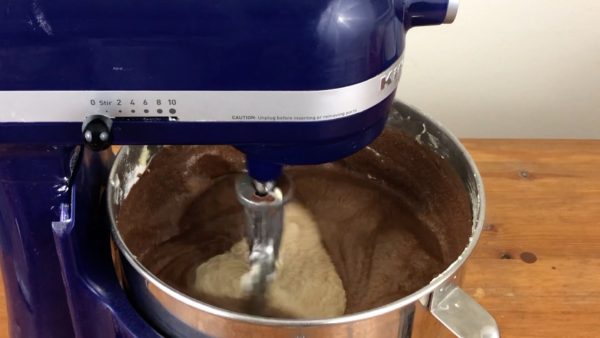
Spray the inside base and sides of each pan with non-stick spray. Divide batter between 2, 3 or 4 cake pans. Bake at 175ºC or 350ºF for 30 minutes if using 4 pans, 45 minutes if using 3 pans, or 1 hour if using 2 pans, or until a toothpick inserted into the middle of the cake comes out clean. Leave cake to cool for 5 minutes. Use a spatula to loosen cake from the edges of the cake pan and then turn onto a wire cooling rack. Leave to cool completely.
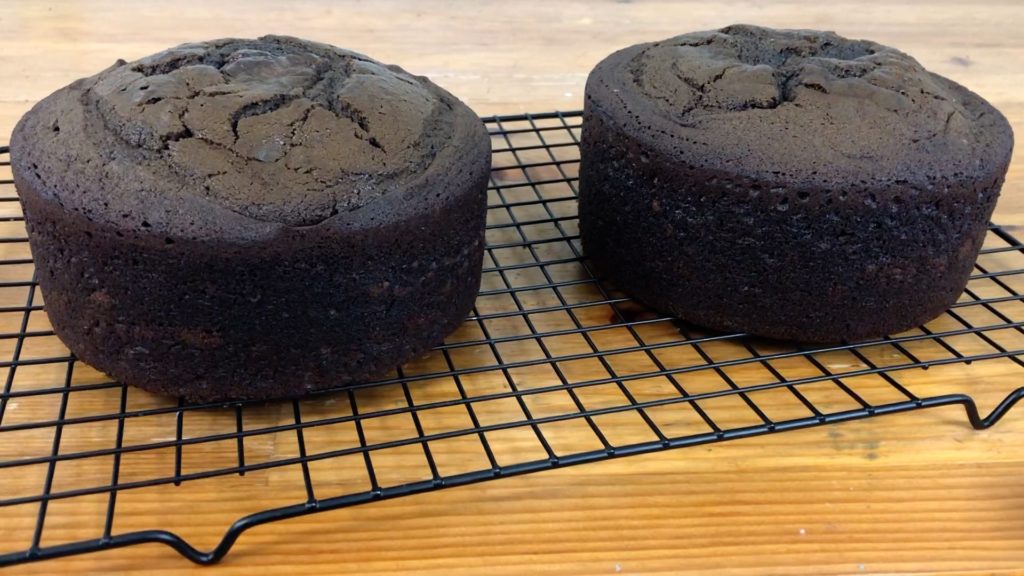
To make the Oreo buttercream is very simple. Make a batch of my 4 Minute Buttercream by mixing butter and powdered sugar in a mixer at the lowest speed setting until it’s smooth. The butter must be at room temperature and I like to add the sugar a quarter at a time, mixing for 1 minute before adding the next quarter, so that the sugar doesn’t spray out of the mixer when you turn it on. Add vanilla and mix for a few more seconds to incorporate.
Divide the buttercream into two bowls: a quarter of the buttercream in one bowl for the filling and the rest in another bowl for the frosting and piped swirls. Place 2 Oreos in a ziplock bag and bash them with a rolling pin, mug, or any other sturdy, heavy object to break them into chunks.
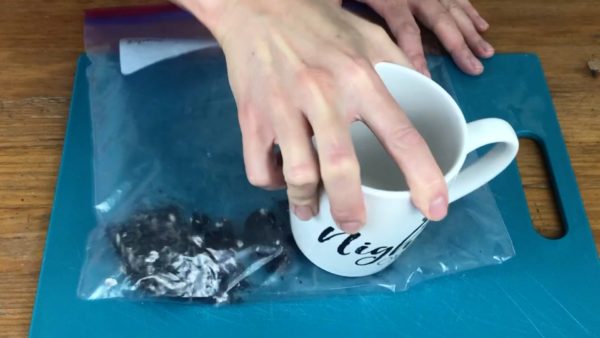
Pour these cookie chunks to the smaller bowl of buttercream. The random sized pieces add nice texture to buttercream so it’s great to use in buttercream as filling between the cake layers, but the chunks are a nightmare for smooth frosting.
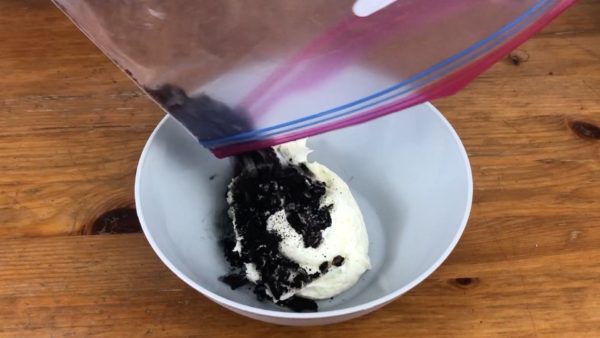
So for the larger bowl of buttercream, which you’ll use for frosting and piping, put 10 Oreos in a food processor or a blender and blitz them until they’re really fine, almost like a powder. Save about 1/4 cup of crumbs to use later in the recipe and add the rest of these crumbs to the larger bowl of buttercream.
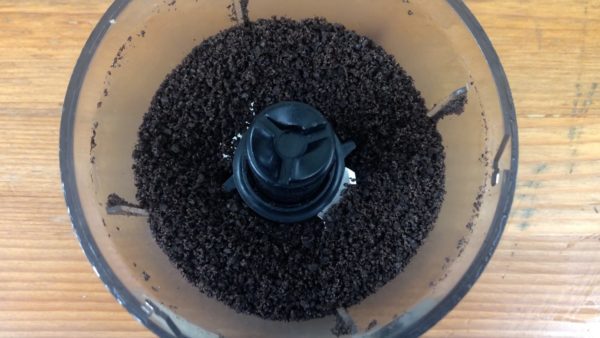
Stir this buttercream as little as possible because if you keep mixing, instead of white frosting with black specks you’ll end up with grey frosting which doesn’t look as appealing.

If you use both methods of crushing the Oreos in chunks and crumbs, you’ll have two different buttercream but if you like, you can just blitz all 12 Oreos in a food processor or blender and use just these fine crumbs in the whole batch of buttercream, to use for the filling and the frosting on the cake.
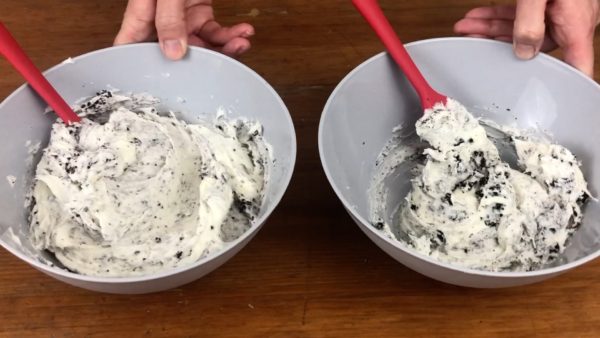
To assemble your cake, attach the first layer of cake to a cake board with a dollop of buttercream. The buttercream will set and secure the cake to the board so it doesn’t slide around while you frost, transport, or serve it.
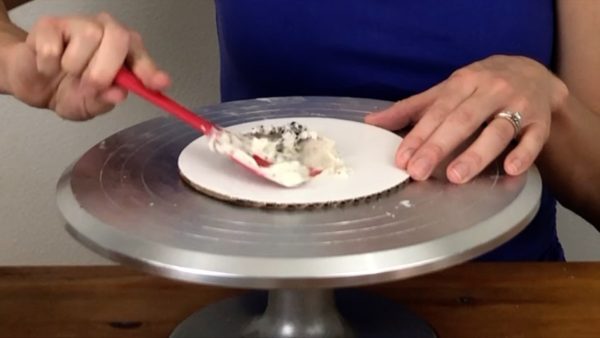
Spread a layer of the buttercream with cookie chunks on top of your first layer of cake. I use my Perfect Chocolate Cake for this because it’s not very sweet, so it balances out the sweetness of the Oreo buttercream. I like to chill my cake layers in the fridge for about an hour before I do this so that they firm up and that makes them easier to move around and to frost.
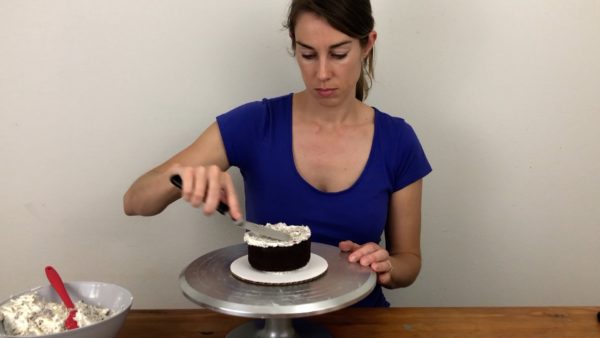
Ignore my serious face in this photo! I’m really enjoying myself, I promise. Alternate your cake layers and buttercream, lining each cake layer directly on top of the previous layer so your cake is straight and not slanting to one side.
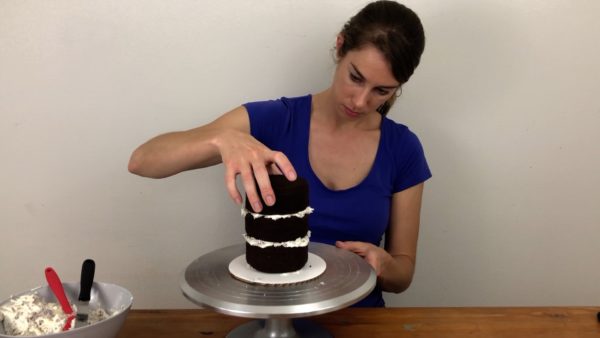
Now use the buttercream with fine crumbs of Oreos to frost your cake. The buttercream should be easily spreadable. If it’s too stiff and it pulls off the cake when you try to spread it on, add milk or cream a tablespoon at a time until it’s the right consistency. I have a very detailed tutorial on my 4 Minute Buttercream with tips on how to check the consistency and I answer the 25 most commonly asked questions about it here. I almost always cover my cakes in a crumb coat before applying a final coat of frosting, so that any crumbs that come off the cake get trapped in the crumb coat and don’t get into the final coat of frosting. But this is an exception. I skip the crumb coat and just spread on one thick layer of frosting and I do this for two reasons.
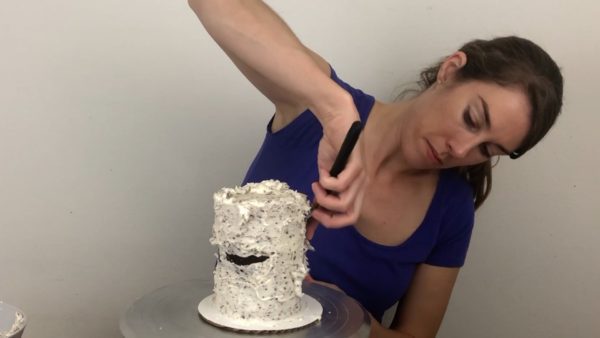
The first is that my perfect chocolate cake isn’t very crumbly when it’s cold, so as long as you chill the layers before assembling and frosting the cake, you won’t get many crumbs in your frosting. The second reason is that the frosting is white with tiny flecks of black cookies, which look identical to crumbs of chocolate cake! So if any crumbs do come off in your frosting, you won’t notice.
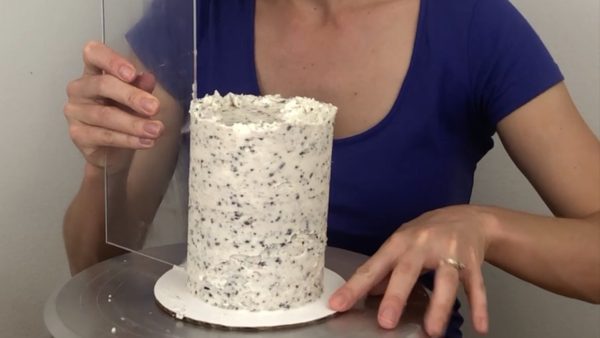
As you smooth the cake, keep the frosting you scrape off in a bowl to use later. When your frosting is nice and smooth, pour the rest of your Oreo cookie crumbs around the cake board and push them into the bottom inch or so of frosting on the cake, to make a border around the bottom.
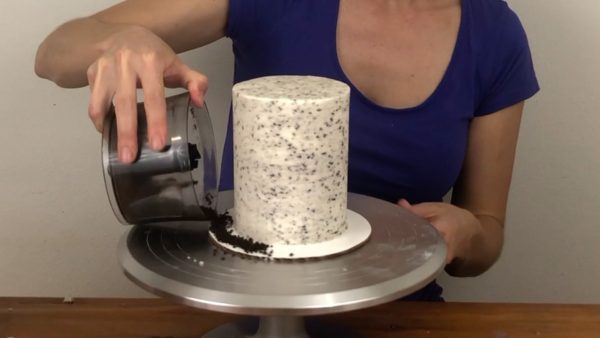
Use your
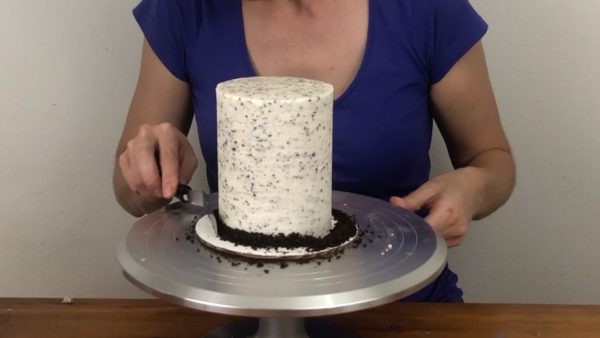
For the top of the cake, press an Oreo into the frosting so it goes right up to the edge of the cake. Press another one in opposite it, so if this was a clock they’d be at 12 o’clock and 6 o’clock, and then put a cookie in the middle on each side, so these would be 3 o’clock and 9 o’clock.
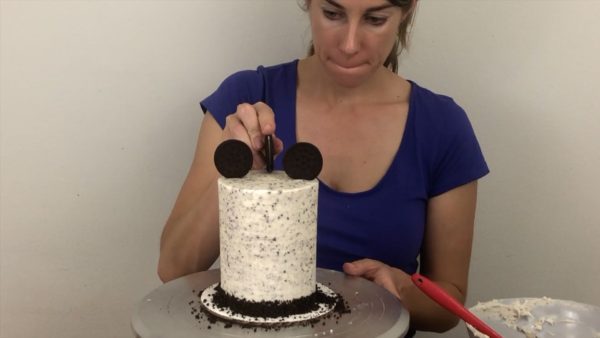
Then add one more cookie in between each of these, to make 8 cookies in total. By adding the cookies in this order you’re making sure they’re spaced evenly around the cake. For an 8 inch cake I would add one more cookie in between each of these cookies to make 16 cookies in total. You can add as many cookies as you like but make sure you leave enough space between the cookies for the swirls of buttercream we’re going to add next.
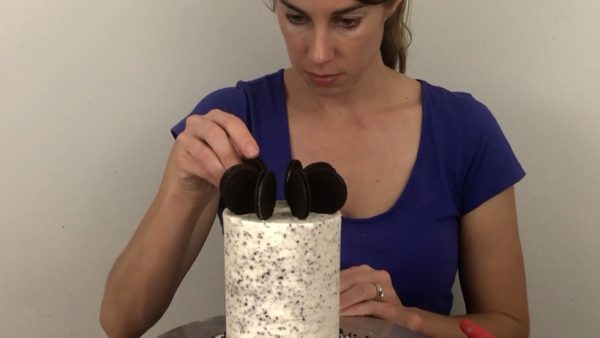
Fit a piping bag with a star tip like this 1M tip and fill the bag with the leftover buttercream from when you frosted the cake. Now hold your piping bag vertically, with the tip facing down between two Oreo cookies and pipe a swirl by spiraling the bag upwards.
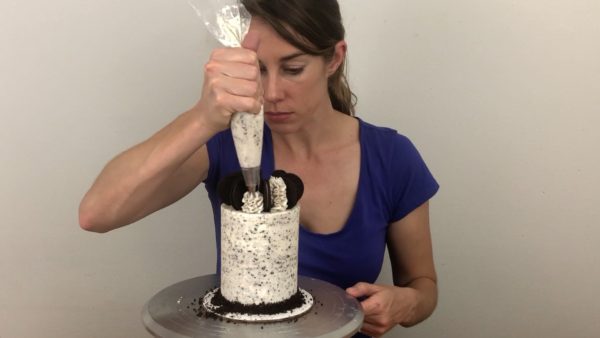
When you get to the top of your spiral, release your pressure on the piping bag as you lift your bag away from the car to leave a neat peak on your swirl. If you let your piping tip brush against the sides of the cookies as you pipe, you’ll make the swirls go all the way up to the sides of the cookies so you’ll completely fill the gaps in between the cookies, which looks tidy but it’s also extra support for the cookies so that they don’t fall over.
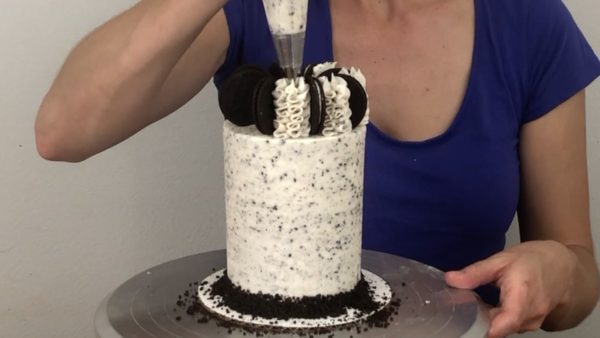
Having very very fine crumbs of Oreo cookies in the buttercream in the bag means you can pipe the buttercream through the star shaped tip and crumbs won’t get wedged in the points of the star and block the buttercream as it tries to come out.
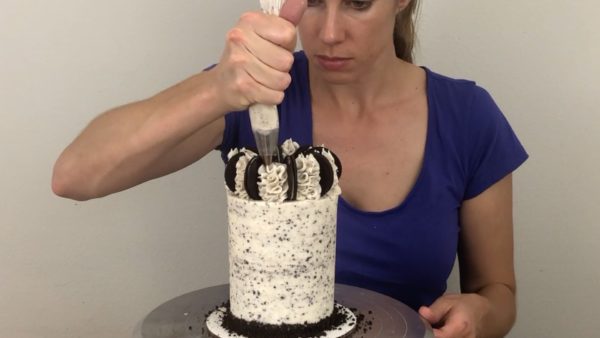
Having very very fine crumbs of Oreo cookies in the buttercream in the bag means you can pipe the buttercream through the star shaped tip and crumbs won’t get wedged in the points of the star and block the buttercream as it tries to come out.
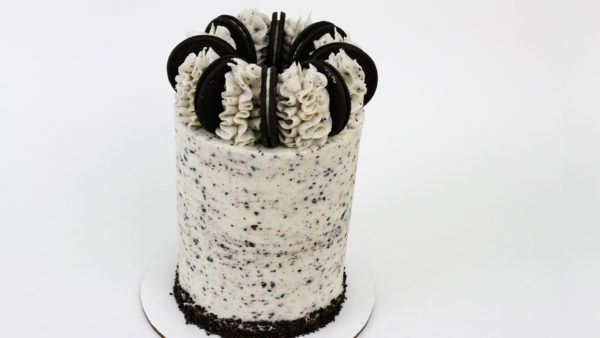
I store frosted cakes in the fridge until 2-4 hours before serving, which gives them enough time to come to room temperature, when they taste the best!
I’d love to see your version of this cake! Please tag @britishgirlbakes in your photos on instagram so I can see your creations!
Here’s the video version of this tutorial:
How do you make buttercream less sweet? Why does my buttercream taste grainy? What’s the right consistency for piping? Can I use buttercream in a hot climate? In this tutorial I answer the 25 most commonly asked questions about my 4 Minute Buttercream, which I use to frost and decorate all of my cakes. If I don’t answer your question, ask it in the comments or take my online course on The Basics Of Buttercream to learn how to make, troubleshoot, colour, store, and decorate with buttercream!
If you prefer to watch a video of this tutorial, scroll to the bottom of the page.
1. Do I need a mixer to make buttercream?
I suppose you could make buttercream without a mixer. You’d have to have a lot of arm strength and also a lot of patience! I love making buttercream in my stand mixer because I can multi-task while it does all of the work for me!
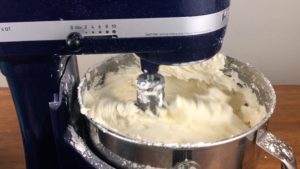
If you have a handheld mixer you could use that instead of a stand mixer but it’s more labour-intensive because even though it’s only supposed to take four minutes to do the mixing, holding the mixer with your hand and moving it through the thick butter and sugar for that length of time is actually really exhausting!
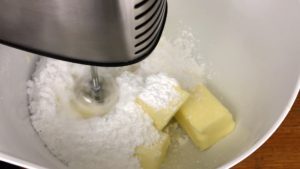
2. Can I use salted butter?
Yes, absolutely! I use salted and unsalted butter interchangeably but if you do it with salted butter just don’t add the salt that’s in the recipe.
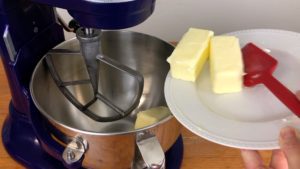
3. Can I use margarine or vegetable shortening instead of butter?
Yes, you can from a consistency point of view. It will taste different. The taste that butter gives the buttercream is really unique and the flavour of margarine and shortening is a little bit different so if you’ve ever tasted buttercream made with actual butter I’m sure you will be able to taste the difference when it’s made with something else.
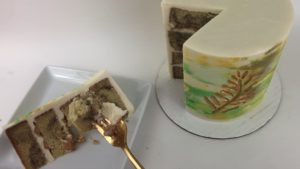
4. Why is my butter more yellow than yours?
Every butter seems to have a different colour. I don’t have a particular brand that I use – I’m living in North America at the moment and the butter that I buy in the supermarket is quite a light colour compared to butters that I’ve used in England and I’m sure it varies from country to country and brand to brand.
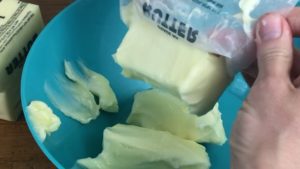
If you mix the butter on its own in the mixing bowl for a few minutes before you start the process of making the buttercream it should lighten the butter a little bit and then you’ll end up with more of a white colour.
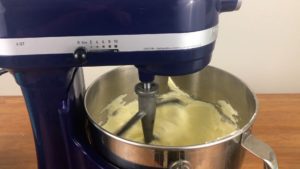
5. What sugar do you use?
Definitely use powdered sugar not normal baking sugar (caster sugar, granulated sugar, or white sugar). It does need to be powdered sugar and it should say somewhere on the packaging that it’s 10x powdered sugar, which just means that it’s been sifted 10 times so it’s a really really fine powdered sugar and if you use one that isn’t as fine you’ll notice the difference in the texture of your buttercream.
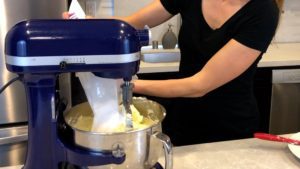
6. How can I make the buttercream less sweet?
A lot of people ask if you can just reduce the amount of sugar in the recipe to make the buttercream less sweet. Although that’s possible to a certain extent (and I’ll explain it in a second), unfortunately this type of buttercream is just a very sweet buttercream so if you don’t like sweet buttercreams I would recommend trying something else.
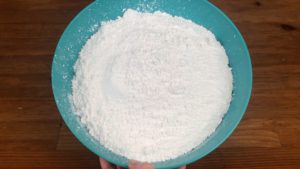
You could try a meringue based buttercream or a ganache instead. This buttercream does rely on the sugar for stability so it’s an essential ingredient. The sugar keeps buttercream firm and that gives it its shape when you’re frosting or when you’re piping.
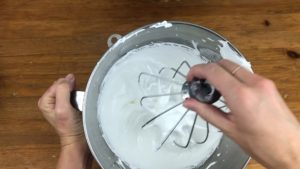
You could reduce the amount of sugar a little bit and also reduce the amount of milk or cream. That way it will still have a similar consistency but if you take too much of the sugar away the buttercream become very liquid and it will slide off your cake or your piping won’t hold its form.
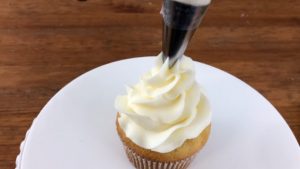
7. Can I use a whisk attachment to make it?
No, a whisk attachment won’t work for this buttercream, it does have to be a paddle attachment or a beater and the reason is because you don’t want to incorporate a lot of air into the buttercream because then it will get air bubbles and the paddle attachment mixes it really well without doing that. The entire purpose of a whisk is to incorporate air so it’s not a good tool for this buttercream.
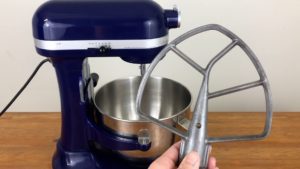
8. Your recipe says 4 minutes but I usually mix it for at least 10 minutes – can I do that?
It isn’t necessary for this recipe. If you want to beat it for longer there shouldn’t be a problem with it as long as you keep the mixer on its lowest setting and as long as you’re using a paddle attachment and not a whisk attachment but it’s not necessary.
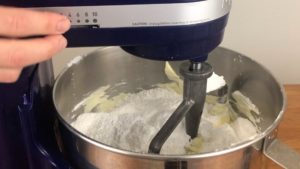
If you beat it for just a minute after each addition of the sugar that will be enough time to incorporate the sugar and the butter together and then once you add the liquid at the end it will be the perfect consistency. You really don’t need to beat it for longer.

9. Why are there little white lumps in my buttercream?
After you’ve mixed powdered sugar with butter to make buttercream you might notice little white lumps or specks in the buttercream. The reason for that is that the butter hasn’t been left to come to room temperature so the butter is too cold. It should be very soft like in this picture.
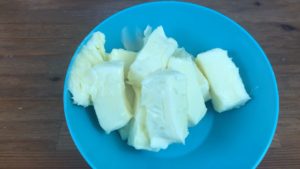
Then when you add the sugar to the butter it forms the little hard granules you can see at the bottom of this cake. It’s an absolute pain and there’s no way to get rid of them other than removing them one by one and you’ll have hundreds in a batch of buttercream! So it’s really really important to let the butter come to room temperature before you start the process of making the buttercream.
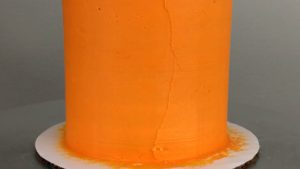
10. Why does my buttercream taste grainy?
The buttercream definitely shouldn’t taste grainy. You shouldn’t notice any texture because it should be very smooth and the reason for that is that the butter and the sugar should completely incorporate to make a smooth buttercream.
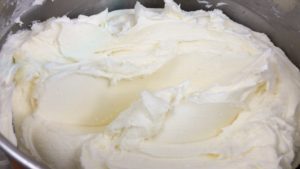
If you do notice a gritty or a grainy texture, that’s from the sugar, not from the butter and it’s either because you haven’t sifted the sugar (sometimes sugar comes pre-sifted so i actually don’t sift the brand that I buy) but if you find that there are clumps in it, you really do need to sift it.
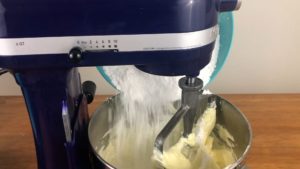
The other reason is unfortunately just the type of sugar that you’re using. It might not be the 10x (the 10 times sifted) icing sugar or powdered sugar so if you try making another batch and you sift the sugar and it still tastes gritty or grainy it’s just the brand of the sugar that you’re using, so I’ve had a lot of people ask me about this and I’ve suggested they try a different brand and they do and then they have fantastic results. So i know it’s not the solution you want to hear but try a different brand of sugar and hopefully everything will work perfectly.
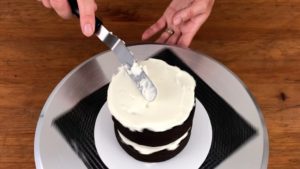
11. Why is my buttercream yellow instead of white?
Butter is a yellow product naturally but some brands are lighter than others. Butter does lighten when you mix it but when you finish making the buttercream, if your buttercream still has too much of a yellowish tinge for what you’re looking for you can try this trick.
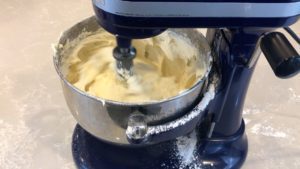
It sounds a little bit strange but use a teeny tiny bit of violet food colour. You can just dip a toothpick into the bottle of colour and then put a really tiny bit to start with. Stir it all together and the violet takes away the yellow tinge and it will make your buttercream look really bright white.
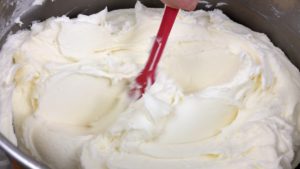
12. Why are there air bubbles in my buttercream?
If you have air bubbles in your buttercream it’s because you’ve incorporated too much air into it, which usually happens when you beat the buttercream at too high of a speed. It really needs to be on the lowest speed of your mixer and if it isn’t because of that then it could be because you were using a whisk instead of a paddle or a beater attachment.
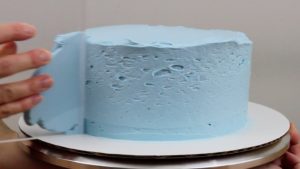
13. How can I get rid of the air bubbles?
If you do have air bubbles in your buttercream you can try and fix it. Put the buttercream in a big bowl and take a spatula and really slap it around in the bowl so really aggressively stir it. Knock the buttercream against the sides of the bowl and that will knock the air out of the buttercream and the more you stir it, the smoother you’ll notice it getting.
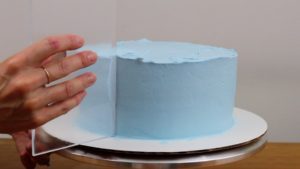
14. How do I know how much milk or cream to add?
I’d suggest adding the milk or cream to the buttercream at the end of the recipe, just a tablespoon at a time so you can observe how the consistency of the buttercream is changing as you add the liquid because once you make the buttercream too liquid it’s very difficult to get it to go back to the right consistency. You’d have to add even more sugar and then it would become really sweet.
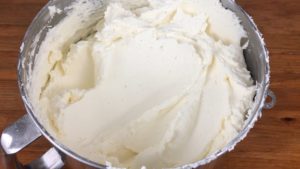
15. How can I tell if my buttercream is too stiff?
I like to use a few ways to test the consistency of buttercream. The first is to pull your spatula through the bowl of buttercream and observe the trail that the spatula leaves behind. It should be a completely smooth pathway behind the spatula so both the buttercream trail itself should be smooth but also the edges of it should be really smooth.
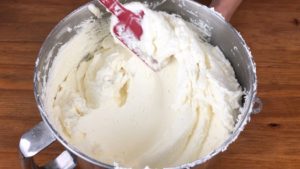
When the buttercream is too stiff you’ll notice there are lots of little holes behind the pathway that your spatula’s left and that’s where the buttercream has broken away from itself and it’s because it’s so stiff that the spatula’s tearing it as you pull it and also the edges of the pathway of the buttercream, you’ll see that they’re really shaggy, rugged peaks where the buttercream has again almost split apart and that’s because it’s really too stiff so you have to add a lot more milk or cream but just a tablespoon at a time so you can see how it does with each tablespoon.
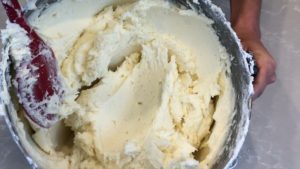
The second way I like to test it is to scoop up a little bit of buttercream on my spatula and then just gently tap the spatula on the side of the bowl. Just tap it once or twice and see if the buttercream falls off. This will vary from person to person depending on how firmly they tap the spatula on the bowl but for me it usually comes off by the second tap and that shows me that it’s the right consistency.
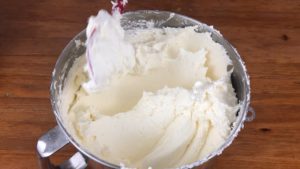
If the buttercream is still clinging onto your spatula it’s far too stiff and if when you lift the spatula up from the bowl the buttercream slides straight off the spatula then it’s definitely too runny.
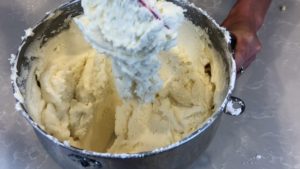
16. What’s the right consistency for frosting cakes?
When you frost a cake it’s essential that your buttercream is the right consistency otherwise you’ll have a nightmare crumb coating the cake and a nightmare trying to get the final coat of frosting smooth. You can test the buttercream when it’s in the bowl before you even start frosting your cake using the methods that I mentioned: by dragging your spatula through the bowl and also scooping up some buttercream and tapping it on the side of the bowl and seeing when it falls off.

But as a second check, you can also test it as you’re frosting the cake. Put the buttercream on your

It should spread really easily like very soft butter spreading onto a piece of bread and your spatula should glide around the cake and then you should be able to swipe your
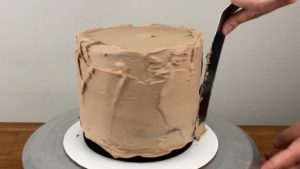
It’s much more common that buttercream is too stiff rather than too loose or too runny. If it is too loose when you spread it onto the cake over the top surface of the cake instead of sticking out over the sides of the cake it will slide right down the sides of the cake rather than staying in that smooth top layer at the top and in that case I would just recommend turning that into your crumb coat, spread it very thinly all over the cake, let it set, add a bit more sugar to your buttercream and beat it again until it gets thicker and then use that for your final coat of frosting.
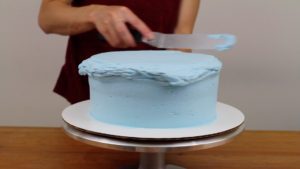
17. What’s the right consistency for piping?
I usually use the same consistency of buttercream for frosting a cake or piping. The exception is for Russian tips, where it needs to be maybe a little bit stiffer so to do that you can either add a little bit more icing sugar and then stir it together again or the other thing you can do is put the frosting in a piping bag put it in the freezer for one minute.
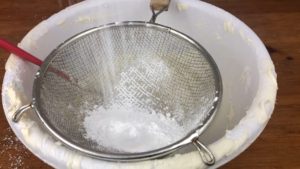
Set a timer for one minute so you don’t forget and then when you take it out of the freezer do a test flower and that should be the right consistency and I have a a very detailed tutorial on 5 tricks to pipe with Russian tips.
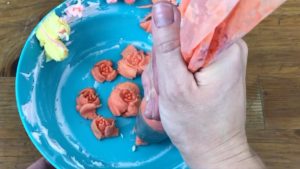
18. My buttercream is too runny. Can I chill it in the fridge or freezer to thicken it?
The only time when I would recommend correcting the consistency of buttercream because it’s too loose or too runny by putting it in the fridge is if you’re really confident that that problem has been caused by heat.

Even if the consistency of the buttercream is correct (it has the right balance of sugar and butter and milk or cream), warmth or heat can make the consistency too loose. For example, if you pipe the buttercream using a piping bag and you either take a long time piping or your hands are really warm, or if it’s a really hot day. In these situations, when you notice that the buttercream starts to get runnier, you can put it in the freezer for 1-2 minutes. Stir it around and then try and use it again and see if the consistency is better.
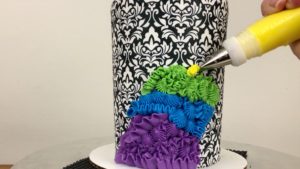
But the consistency may be too loose because there’s too much liquid in the buttercream. For example, maybe you added too much milk or cream or a liquid flavor ingredient like strawberry puree or lemon curd. If this makes the buttercream too runny I wouldn’t recommend putting it in the fridge or freezer because the temperature of the buttercream is not going to fix the consistency.
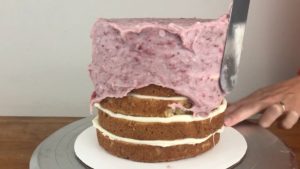
19. Can I use this buttercream in a hot climate?
Yes, you can! I started baking and decorating cakes in Costa Rica, which has pretty extreme summers especially at the beach and I used this buttercream and I never had any problems. There are a few precautions you could take and there is a substitution you can make.
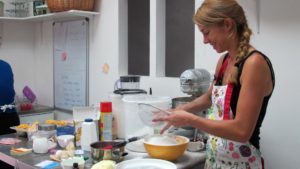
If you’re going to serve a cake outside on a hot day, keep the cake in the fridge until you serve it or until you have to display it outside so that it stays cold for as long as possible. Also keep it in the fridge until you transport it because a cold cake is going to resist the vibrations and the movements of travel a lot better than a cake at room temperature.
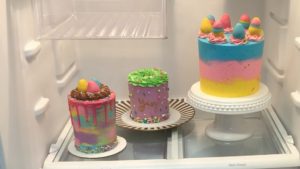
If you have had the cake in the fridge until you transport it or take it outside, if it sits outside for an hour or two before you eat it that will be enough time for it to go from being cold just to room temperature rather than completely melting in the heat. Find a place in the shade to display it, ideally with a breeze or fan blowing on it!
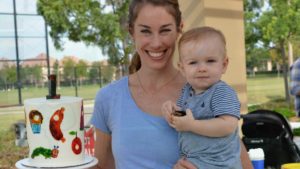
If you put any cake with any frosting in full sunlight on a hot day with no breeze it’s probably not going to last very long – the frosting will droop, the filling may cause a bulge in the frosting, and the frosting might even melt and slide down the sides of the cake. This buttercream isn’t an exception but you can use a substitution to make the buttercream even more stable than it already is.
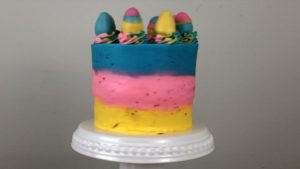
The substitution is to switch out the butter for a vegetable shortening like Crisco, Trex, or any other brand. I can personally taste the flavour (I’ll talk about that in a second) so what you could do is you could switch half of the butter out for the vegetable shortening and leave the other half and that way the buttercream will stand up a little bit better to the heat.
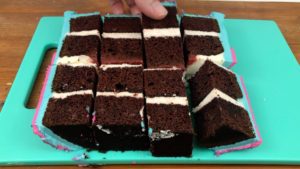
To combat the flavour of the substitution, in Costa Rica when I made a cake or cupcakes to sit outside in the heat for a long period of time I switched out half of the butter for shortening but also added a teaspoon of artificial vanilla essence for every batch of buttercream. Keep the original measurements of the real vanilla extract in the recipe and for some reason the addition of the artificial vanilla essence takes away the shortening flavour. I don’t know the science behind it, it’s just something I stumbled upon that works!
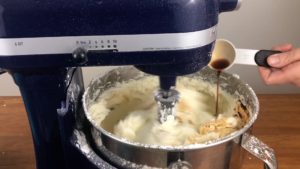
20. How do I make chocolate buttercream?
To make chocolate buttercream you can either add cocoa powder mixed with a bit of liquid or you can add melted semi-sweet chocolate or you can add both. I share my favourite recipe and a video tutorial here.
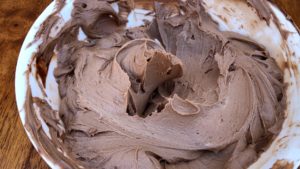
21. How do you get such bright colours on your buttercream cakes?
I use gel colours. I don’t have just one brand that I use, I’ve tried Wilton, Americolor and Chefmaster and I really like all of them. The advantage of gel colours over liquid colours (the kind you can buy in the supermarket or grocery store) is that they’re really concentrated so you don’t have to use a lot to get really bright colours.
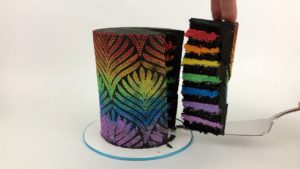
Apply gel colours just a few drops at a time. Because they’re so concentrated, you don’t need to use much to get a bright colour. However, you do have to use quite a lot of them to get very dark colours like a dark purple or red or black buttercream. Add a few drops of colour, stir to mix the colour into the buttercream, and then check the shade of the colour.
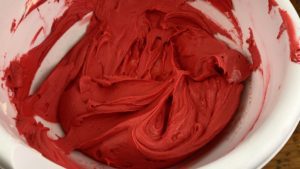
When you think you’ve got a colour similar to the shade that you want, maybe a little bit lighter, cover the bowl with cling film/saran wrap/a lid and leave it for 30 minutes. With time and exposure to air the colour starts to darken so it will get a few shades darker in that time. If you want the colour to be even darker you can add a few more drop of gel colour. This works well for dark colours like black buttercream.
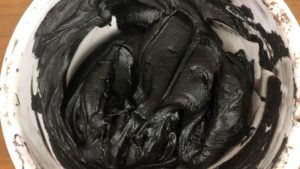
22. How do you get your buttercream so hard on your cakes?
My 4 Minute Buttercream is what’s called a crusting buttercream which means because of the amount of sugar in it, when it’s exposed to air it will eventually crust which means it just forms a harder surface. When it crusts, you can apply pressure to it without damaging it.
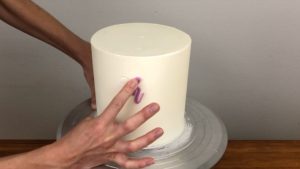
I exaggerate this by putting cakes in the fridge so that the buttercream sets really hard and that lets me do all sorts of decorating techniques like decorating with acetate transfers, stenciling, and even carving buttercream. All of those techniques really rely on having a very firm buttercream.
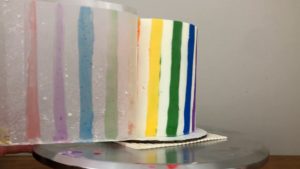
If you don’t want to or can’t refrigerate your cake, you can just leave it at room temperature. It will still form a crust on the outside but it won’t get as hard as it does when it’s in the fridge so the buttercream will be a bit more fragile when you’re decorating it.
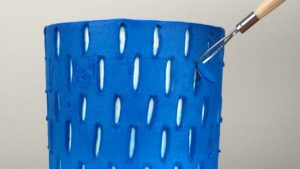
If you do put your cake in the fridge and it gets that very hard frosting, when you take it out of the fridge and you leave it to come to room temperature before you serve it, the buttercream will soften again.
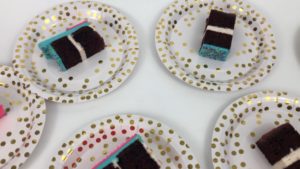
23. How long can I leave my buttercream at room temperature?
Because of the amount of sugar in the buttercream you can leave it at room temperature longer than you might leave a cup of milk at room temperature.
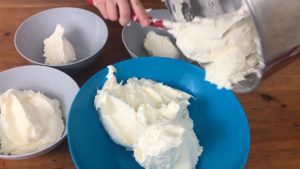
It must be sealed properly, which means covering it tightly with cling film or saran wrap or a lid because if it’s exposed to the air it will crust on the outside and then when you stir the buttercream you’ll get little chunks of crusted buttercream within it. Covered buttercream will be fine for two to three days at room temperature.
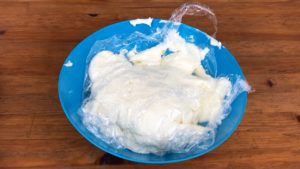
24. Can I leave buttercream in the fridge?
You can put buttercream in the fridge. The same as for room temperature, it’s really important to seal it properly and then you can leave it in the fridge for a week or up to two weeks.
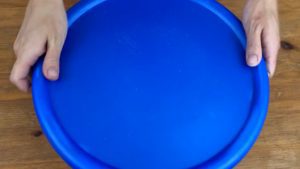
25. Can I freeze buttercream?
You can freeze buttercream! I like to do it in a ziploc bag because it’s easier to fit in the freezer than a big tupperware or bowl but you can do it however you like as long as it’s a sealed container.
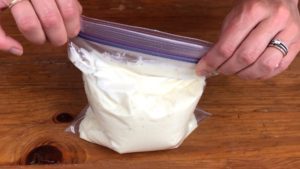
Take it out two or three hours before you’re ready to use it so that it has time to thaw and come to room temperature. Then put it in a bowl and stir it and if it still has lumps of hard buttercream in it, wait for about another hour and then stir again.
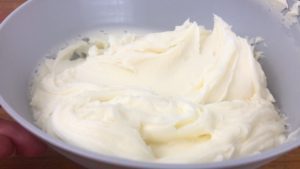
You’ll notice that the buttercream looks quite air bubbly so stir it a few times before you use it to knock those out and then it will be perfectly smooth and it will behave the same way as if you’d never frozen it or put it in the fridge in the first place.
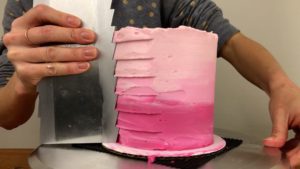
I hope I’ve answered all of your questions about my 4 Minute Buttercream. You can find the recipe and video tutorial on how to make it and check the consistency and add other flavours here and if you have any questions I haven’t answered, please ask them in the comments below!
Here’s the video version of this tutorial:
When you first start baking and decorating cakes, it seems like there are a LOT of things to buy and it can be difficult to decide where to start. In this tutorial I’m going to show you the essential tools you’ll need to get started for baking, frosting, and very basic decorating, with my recommendations on which tools you can buy cheaply and where it’s worth splurging for better quality. After the bare essentials, I’ll share my suggestions on the next tools you might want to buy to be able to expand your baking repertoire and to do more elaborate cake decorating. I have an Amazon storefront where you can see all of the tools I use. If you prefer to watch a video of this tutorial, scroll to the bottom of the page.
Tools for Baking a Cake
A mixer is definitely worth investing in, unless you have extreme patience and arm strength to mix with a spoon! You’ll use a mixer to mix cake batters and make frosting.
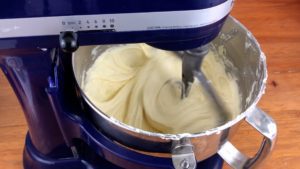
It can be a stand mixer or a hand mixer will work too, although it’s a bit messier and harder work to use. This is probably going to be your biggest single investment so take your time to research and choose your mixer.

If you’re planning on baking often, a stand mixer will save you time and if you’re a multitasker like me, it’s a dream because you can leave it to mix your ingredients while take out the ingredients for your next recipe or wash other tools or start prepping your cake decorations.
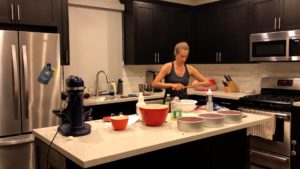
I’ve had my current Kitchen Aid mixer for six years and I had a smaller one for six years before that and I’ve loved both of them. Whether you choose a handheld mixer or a stand mixer, what’s important is that it has a beater or paddle attachment so that you don’t incorporate too much air into your cake or frosting.
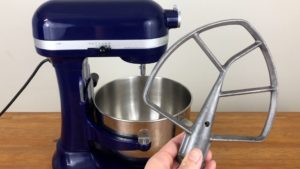
If it has a whisk attachment, great! You can use that to make meringue pops, macarons, or ganache.

You might already have lots of the other tools you’ll need for baking, like measuring cups and spoons, mixing bowls, spatulas, cake pans, a spray bottle of cooking oil, and a wire mesh cooling rack.
If you have any type of these things, I’d suggest working with what you’ve got and investing in the things you don’t have, but if you’re going to buy them, here are my favorites:
For measuring cups and spoons, I like to have two sets so that when I’m baking I can use one set for dry ingredients and one for wet ingredients, instead of having to wash and dry them between different ingredients. It’s useful to have measuring spoons all the way down to an 1/8 of a teaspoon for small batches, but you can always just use a 1/4 of a teaspoon and fill half of it.
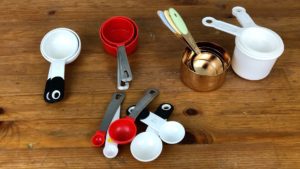
Some recipes list ingredients in weights and I like to weigh my cake batters so that I can divide it equally between my cake pans, so a scale is useful. If you’re baking anything bigger than a 6 inch cake and you want to weigh the batter in the pans, make sure the scale is big enough that you can see the screen with the weight.
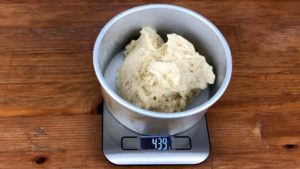
For mixing bowls, some people prefer study bowls but I like lightweight plastic ones that I can move around easily and stack on a drying rack without worrying about them falling and breaking. I like to have large bowls and small bowls to choose between depending on how much of an ingredient I need to mix or how much buttercream I want to add colour to.
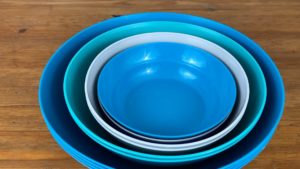
It’s helpful to have a bowl with a lid so you can store your prepared dry ingredients or a batch of buttercream in that same bowl.
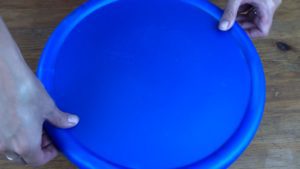
Rubber or siliconespatulas are great for getting all of your cake batter or frosting out of your mixing bowl, and for adding colour to buttercream. The advantage of silicone is that it’s heatproof so you can use it to stir very hot simple syrup or leave it in the pan for several minutes you’re cooking fillings like fruit purees.
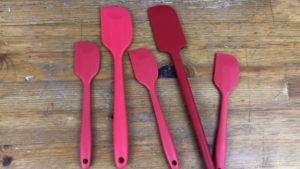
If you have to choose one size of cake pans, I’d choose 6” pans and I’d buy two of them, or three if you can. A 6 inch cake will serve 12 to 20 people, so it’s big enough for small gatherings and celebrations, but if you’re practicing baking or decorating you’re not using a huge amount of batter and frosting to practice with.
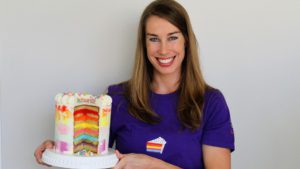
I divide my cake batters between two pans and when the cakes cool I cut them in half horizontally to make two layers, so I end up with 4 in total. If you don’t want to cut your layers in half you could buy 3 or even 4 pans and divide your batter between them so you can use the layers as they are.
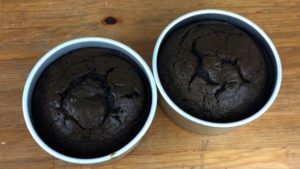
I don’t recommend re-using the same pan to bake your cakes one after the other because you’ll waste a lot of time waiting for the cake and pan to cool before washing and drying and re-using it, and if you leave some of your batter to sit out that long before baking it you might notice a change in the texture on the top of the cake and a difference in how it rises.
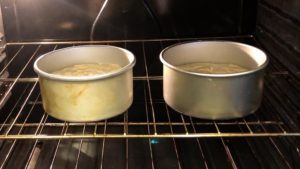
As far as the type of pans you buy, make sure the sides of the pans are straight, not angled, and the thicker the pans are, the less likely they are to dent or bend, which will make your cakes stick to the pan and difficult to turn out of the pan after baking. I go into this in much more detail in my online course on the Basics of Cake, as well as how to mix, bake, assemble, frost, decorate, store, transport and serve cakes. Use the code STARTCAKING for 25% off the course!
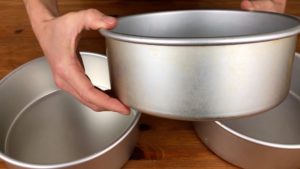
I spray my pans with oil before adding the batter and you don’t need special baking oil, any oil is fine or you can grease the pans with butter if you prefer.
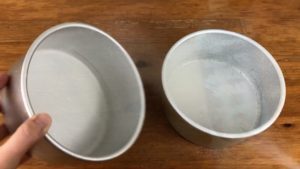
For a cooling rack, anything with a mesh design will allow an air flow for the cakes to cool but make sure the rack is big enough for your cakes, for example if you’re planning on baking 8 inch cakes of two layers each, you’ll either need a rack big enough to fit both layers side by side or you’ll need two cooling racks.
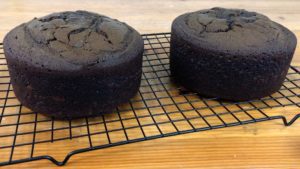
Tools for Frosting a Cake
The most important tool for frosting a cake is a turntable and this is where I definitely recommend paying a little bit more for a metal turntable over a plastic one. They’re about double the price but the smoothness of the spin is far superior to the jerky movements of a plastic
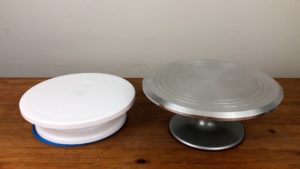
The smoothness of the spin of your
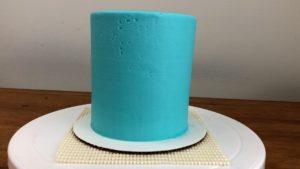
To stop your cake board from sliding around on your
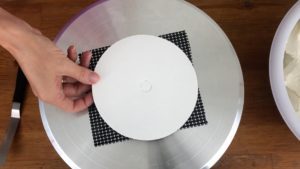
You’ll need a cake board for your cake and I like to use a board 2 inches bigger than my cake to leave space for frosting and any decorations, as well as leaving some of the board empty around the cake to hold onto when you pick the cake up. So if you’re baking 6 inch cakes you’ll need 8 inch cake boards.
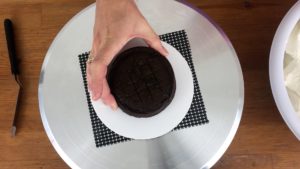
I like thin cardboard rounds with a greaseproof lining, which prevents ugly grease stains from spreading out across the board. You can buy much thicker boards called cake drums for larger, heavier cakes but for 6 or 8” cakes, thin cardboard cake boards will be fine.
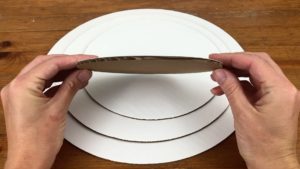
To apply your filling and frosting to the cake you’ll need an
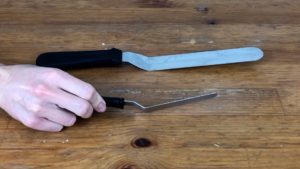
Then you’ll need a frosting smoother to scrape around your frosted cake to smooth the frosting. These come in plastic, metal or acrylic.
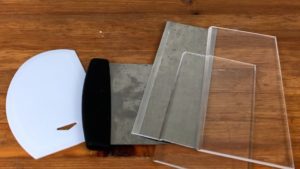
I’ve used every material and I like them all but my favourite is this acrylic smoother because it’s thick and heavy which helps to line it up straight against the cake and it has a slanted, sharp edge for really smooth sides and sharp edges at the top of the cake. I use this one and you can use the code BRITISHGIRLBAKES to get 10% off yours!
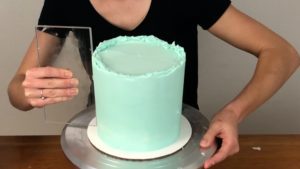
I like this plastic frosting smoother for crumb coats of frosting because it’s flexible and lightweight and quick to clean off between scrapes. Plastic smoothers dent easily though, which leaves grooves in your frosting, so they’re not ideal for the final coat.
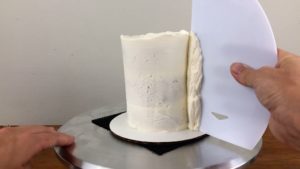
Whatever frosting smoother you choose, make sure it’s at least as tall as your cakes, otherwise you’ll have to go around twice as many times to smooth both the bottom and top of the sides of your cake. Practice makes perfect for smooth frosting so if you don’t love your results the first time you use a frosting smoother, I’d suggest give it another chance with another cake before buying a different one.
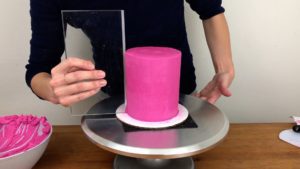
To tint your frosting different colors you can use liquid colours, the kind you can buy in the supermarket or grocery store, but you have to use a LOT to get a bright colour and you’ll water down your buttercream by adding so much liquid.
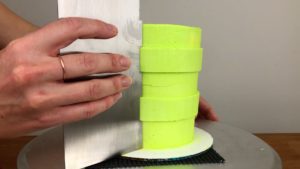
Gel colours are better because they’re much more concentrated so they’ll make really bold, bright colours without affecting the consistency of your buttercream.
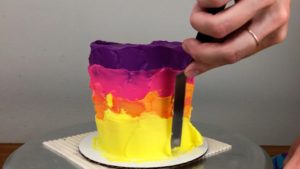
Tools for Decorating a Cake
Now that I’ve explained the tools you need to mix, bake, assemble, and frost a cake, I’ll show you around my cake decorating cupboard and share my go-to tools for simple decorations on cakes.
Piping bags and piping tips are cheap to buy but very versatile – with a few piping bags and piping tips you can do all sorts of things, like piping lace flowers, piping pretty petals and other shapes as filling between layers on a naked cake, creating buttercream dams for fillings like caramel or fruit purees, or piping intricate flowers.
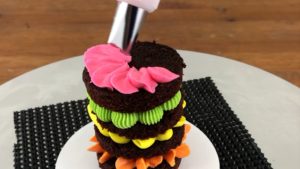
My favourite piping tip is a star tip like this one made by Wilton, called a 1M tip. With just this one piping tip you can pipe swirls on cupcakes or on top of cakes, or ruffles, rosettes, or this rope style border.
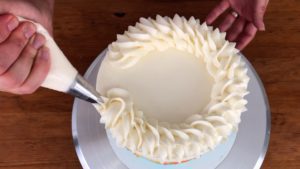
A star tip is also great for piping meringues for meringue pops, which you can use to decorate cakes like number cakes.
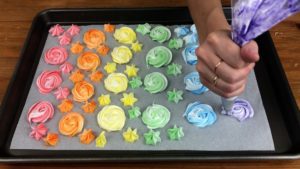
It you’re going to buy just a few tips I recommend a 1M star tip, a petal tip like a #125, an open star tip like a 4B or 8B or #199, and a large round tip like a #1A. I have a tutorial on 8 Ways to Use a 1M Piping Tip and another tutorial on 8 Ways to Use A Petal Tip if you’re looking for ideas of techniques to try with them. If you’re feeling adventurous, it’s fun to experiment with Russian tips as well.
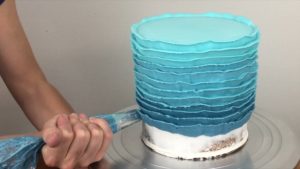
I’m a huge fan of texture on cakes and you can buy all kinds of textured cake combs to easily create patterns in your frosting. I like the double sided combs so you get two textures out of every comb you buy. Just as with frosting smoothers, any material will work as long as the comb is at least as tall as your cake.
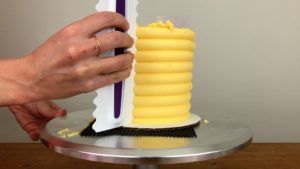
I use squeezy bottles (condiment bottles) to drizzle my cake layers with simple syrup to keep them moist and also to apply drips, which you can do with a spoon but I like the control and speed of a bottle.
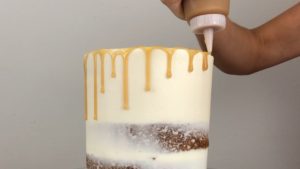
With stencils you can create all sorts of designs on cakes and cake toppers. I have probably close to a hundred stencils, mostly very cheap ones from amazon that work fantastically, just as well as fancy expensive ones. With stencils you can do much more than just covering frosting and to help you get the most out of your stencils I have a tutorial on 16 Ways To Use Stencils On Cakes.
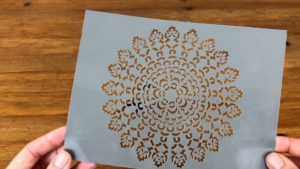
Cookie cutters are another versatile tool and, you guessed it, I have a tutorial on 6 Ways to Decorate Cakes with Cookie Cutters! I love re-purposing tools for different techniques instead of having to invest in new tools that you can only use for one thing.
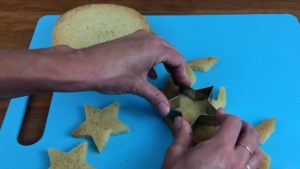
I think sprinkles can be overused and I don’t love the crunch they add to frosting but they’re an interesting way to add colour to your cake layers for a fun surprise when you cut into the cake, and for piñata or sprinkle explosion cakes. Sprinkles are great if you’re looking for a quick and easy way to decorate cakes. I like the detail they add to techniques like stenciling and piping.
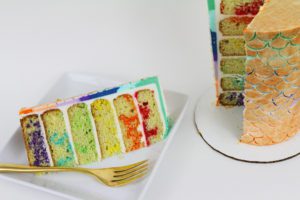
I love decorating with acetate to create unique designs like transferring a design from wrapping paper onto a cake or creating vertical stripes. If you can find it, buy acetate in a roll so it curves naturally and that makes it much easier to apply the design onto the curved sides of a round cake.
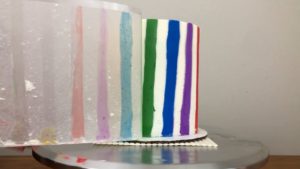
Look for a roll that’s taller than the height of your cake so you can cover the whole cake with just one transfer. This one is my favourite.
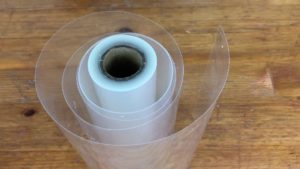
If you’re interested in buttercream carving, these carving tools are a very cheap investment with huge potential for experimenting with different techniques to carve designs into buttercream.
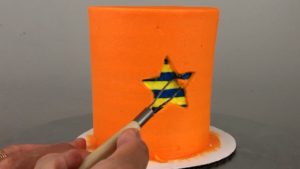
Cake stands are nice to have if you want to take pretty photos of your cakes or display them for events or gatherings. If you can buy more than one, choose a few different sizes and colors and materials so that you have one to fit your cake’s theme.
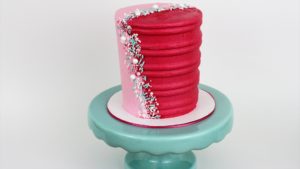
If you’re going to transport your cakes you’ll need a cake caddy. Make sure the one you buy is wide and tall enough for your cakes – I like this cupcake caddy with a removable shelf because it’s extra tall so cakes with toppers will fit inside it.
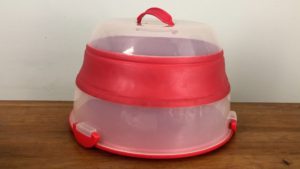
Instead of a cake caddy, you can buy cardboard boxes for a more professional appearance. Buy a box at least as tall as your cakes and as wide as your cake boards. If the box is bigger than your cake, use a ring of masking tape to secure your cake board in place so that it doesn’t slide around within the box.
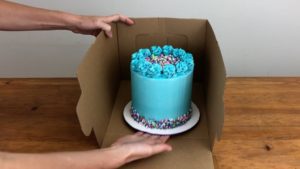
I always have a stash of paper plates and candles since I try to give my cakes away to anyone who comes over so that I don’t eat them all myself, and I also make sure I keep cards to give with my cakes when someone asks me to make a cake for a party, so that they know the cake was a gift.
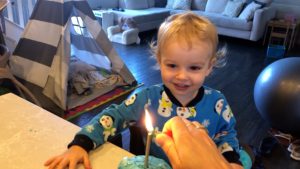
If you want to write on your cakes, Sweet Stamp make beautiful lettering sets in different fonts and also fun themed sets of shapes for occasions like baby showers or Christmas. You can use the code BGB10 to get 10% off your order here!
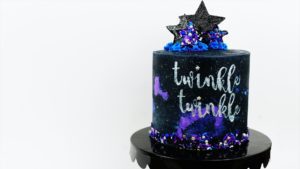
You can get good quality edible paints by Sweet Sticks to paint your letters and these are also great for painting designs onto the frosting on your cakes. You’ll need some very fine paintbrushes too. I have a discount code for sweet stamp letter sets and I’ve put the code below in the video description.
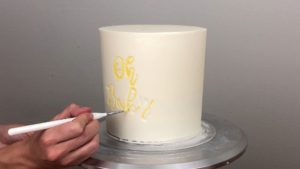
There are endless baking and cake decorating supplies that you can buy, but I think those are the most versatile and useful ones. If you choose to sell your cakes, you can buy these as you need them and your orders will end up paying for the tools and materials in time.
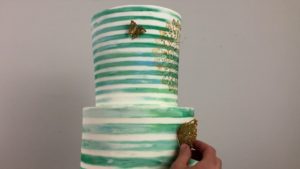
As a side note, if you start selling your cakes, you’ll probably need to invest in a separate cake fridge to fit all of your cakes. I recommend getting one with a freezer section so you can bake your cake layers in bulk in advance and freeze them, and it’s also useful if you need to chill cake decorations quickly, like chocolate sails or piped buttercream flowers or buttercream cut-outs. Anyway, selling your cakes is a whole separate topic for a tutorial!
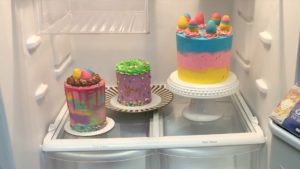
I hope this tutorial has been helpful in outlining the essential tools you need for baking and frosting cakes and some useful cake decorating tools to start out with. When you’re ready to take your cake decorating to the next level, check out my online course on 10 Cake Decorating Techniques!
Here’s the video version of this tutorial:
In this tutorial I’ll share an exclusive glimpse of professional cookie decorating behind the scenes in Sweet Spot Studio, where I met and shadowed an expert cookie decorator. I’ll show you the step by step process for decorating cookies (including Chef Jossie’s three tricks for perfect piping) and then demonstrate how to use cookies to decorate a cake. I’ll finish with my attempts at cookie decorating and some bloopers. If you prefer to watch a video of this tutorial, scroll to the bottom of the page.
On a cross-country hunt I found a professional cookie decorator who was willing to share her secrets on how to create her gorgeous cookies.

I spent an evening with Chef Jossie at Sweet Spot Studio in Charlotte in North Carolina learning all about how she decorates cookies with eye-catching colours, textures, and intricate details, which I’m now going to share with you!
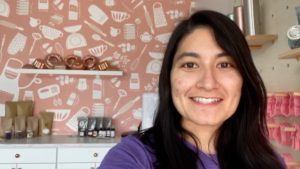
To decorate cookies you’ll need cookies, of course, and royal icing, which you can buy or make yourself. When you’re not using it, cover it with a damp towel to stop it from drying out.
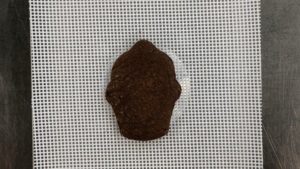
Tint small amounts with gel colours to use in piping bags next, and you’ll need a stiff and loose consistency of each colour for different parts of the cookies.
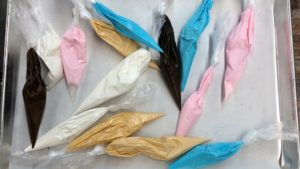
Start by outlining each colour of your design, using the piping bag with the thicker consistency of that colour of royal icing.
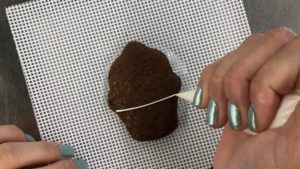
There are three tricks for outlining your cookies. The first two go together and they’re speed and pressure. When you find the right combination of the speed you move your piping bag and the pressure you squeeze your bag with, you’ll pipe a perfectly straight line.
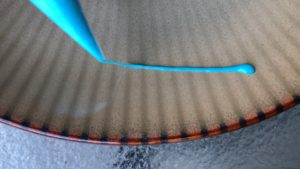
If you move your bag too slowly or apply too much pressure to the bag, the icing will wiggle as you pipe and your line will be more of a zig zag, like the top line here.
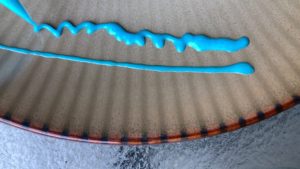
If you move your bag too fast or don’t apply enough pressure to the bag, the icing won’t be able to keep up with you and your line will break, like the bottom line here.
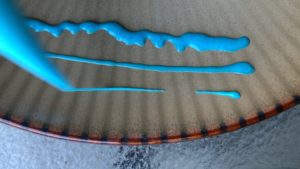
The bigger the hole you cut in your piping bag, the faster you’ll have to move your bag and the less pressure you’ll need to apply compared to if you cut a small hole, and then you’ll need less pressure and can move the bag more slowly. So for the most control as you pipe, a small hole is easiest.
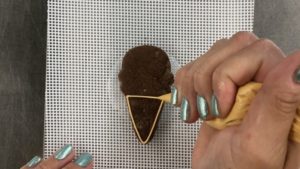
The third trick is the height that you hold the piping bag above the cookie. When you’re first learning, it feels natural to hold the bag just above the cookie and you’d imagine that your piping would be best when you’re close to the target.
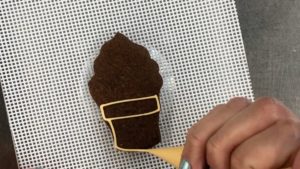
But actually, you have the most control when your piping bag is higher up, and when you’re directing the royal icing from a bit of a distance you’ll get much neater, more accurate lines.
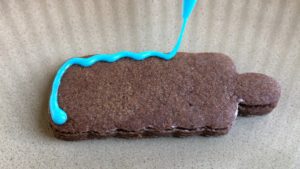
None of this matters if the consistency of your royal icing is too thin or too thick. If it’s too thick, your line will break as you’re piping and you’ll leave visible texture in your lines. If it’s too thin, it will spread out as you pipe so your line won’t be as sharp and any angles or curves will bleed into each other and might even slide off the side of the cookie.
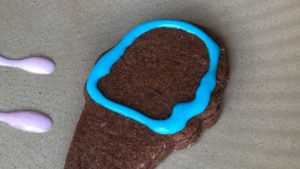
When you’re outlining your cookies you need to outline every coloured section, so for this cookie there’s the beige coloured ice cream cone, this first layer of white ice cream and then some pink ice cream and then more white on the top.
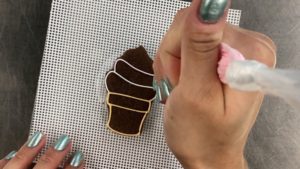
These little cookie turntables are amazing by the way, but they’re definitely not essential. You can decorate on any flat surface, it’s just convenient being able to spin the cookie around like this. To buy a cookie
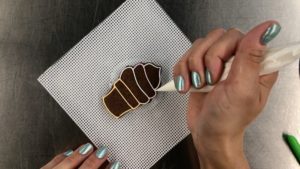
Immediately after outlining all of the coloured sections of the cookie, it’s time to flood them. Flooding is just filling in an outline with royal icing of a looser consistency, so as you squeeze it out of the piping bag it spreads out to cover the cookie all the way up to the outline.
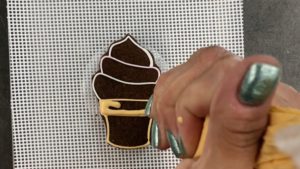
You can use a pin like this, called a cookie scribe, to push the icing all the way to the outline and also to pop any air bubbles in the icing.
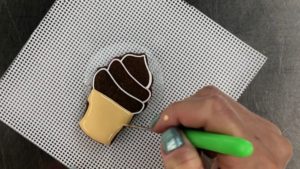
For sections of colour next to each other, you can either flood them straight after each other or you can wait for the first section to dry before you flood the next section. If you flood coloured sections next to each other so different colours of wet royal icing are touching each other, the colours will blur together where they meet instead of having a clear cut line.
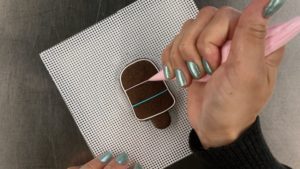
That might be the effect you want, like for this popsicle where the colours don’t have a distinct division between them, it’s kind of blurry, because the pink and white and blue royal icing touched each other while it was still wet so the join is fluid.
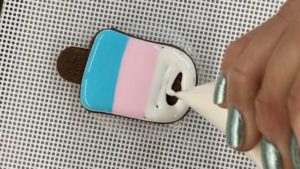
The other option is to flood areas that aren’t touching each other and then let those dry before continuing. Royal icing takes several hours on its own to dry but you can speed up the process by putting the cookies in front of a fan or they’ll dry even faster in a dehydrator.
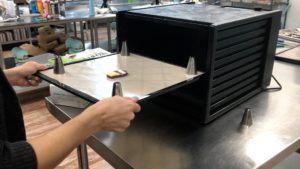
For this ice cream cookie, the beige cone and the pink section of ice cream were flooded first. The sections in between were left out so that no wet icing sections touched each other. After flooding these two sections, the cookies was dried in a dehydrator for about 5 minutes to set those colours of icing.
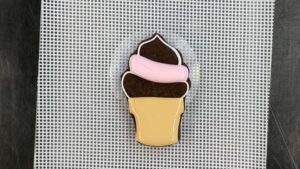
Then when white icing floods the adjacent section it goes right up to the edge of the pink icing but because the pink icing is dry and hard, the join between them is clear and solid, so the pink and white are separate sections of colour with distinct boundaries.
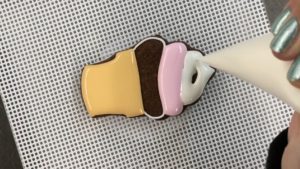
Compare the pink and white and blue popsicle cookie (where different colours of icing were piped side by side without drying in between) to the pink and white ice cream cookie (where wet icing was piped next to dry icing).
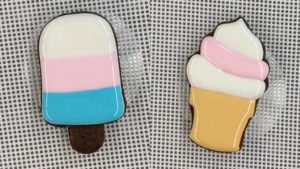
After drying the first round of flooding there are several techniques you can use for the next round of icing; flooding, adding detail lines, adding texture, layering shapes, and attaching decorations.
Flooding
You can use royal icing with a thin consistency to flood more areas, filling in other colour sections, like the stick on this popsicle. By drying the rest of the icing first, the division between the stick and the popsicle will be more distinct than if you’d piped the stick right next to the blue icing while it was still wet.
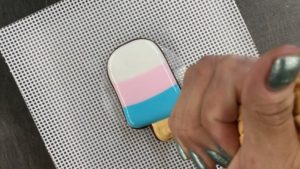
Add detail lines
Now that the sections you flooded first have dried and hardened, you can add detail lines like making the waffle texture on this cone, and the piping will sit on top of the layer of icing that’s dry.
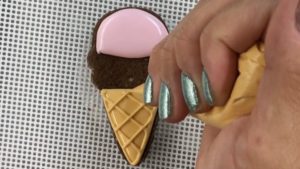
You’ll need a stiff consistency of icing for this, the same stiffness as you used to outline. If you had piped these details on before letting the first layer dry, the details would sink into the wet base layer of icing.
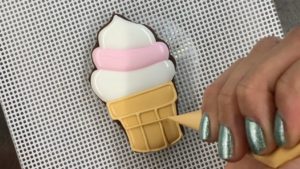
Add texture
Using a stiff consistency of icing, the same as you’d use for outlining shapes, add texture to cookies. For example, these squiggly circles are holding their shape after being piped.
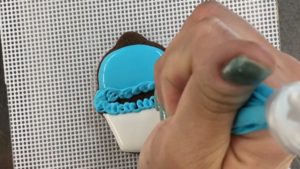
This texture is great for the rough part at the bottom of a scoop of ice cream. To make it look less neat you can smudge the lines by scratching them with a cookie scribe.
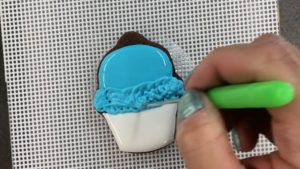
The same technique works well for the texture at the top of an ice cream cone, using zig zag lines instead of circular loops. If you used thinner icing, like you’d use for flooding shapes, the icing would sink down and spread out and lose its texture.
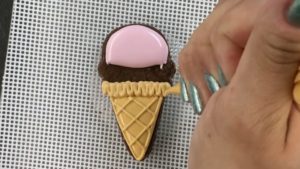
Layer shapes
By outlining another section of colour over one of the first sections of colour, and then filling it in. This is going to look like chocolate syrup on top of the pink ice cream. By piping this on top of another colour which has already dried, you’re adding thickness to the icing, which adds dimension and it really looks like syrup poured on top of the ice cream.
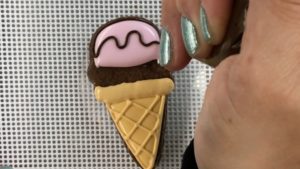
This icing is a combination of the stiffer icing used for outlining and the thinner icing using for flooding, so the consistency is somewhere in the middle and it works for outlining this syrup and also flooding it.
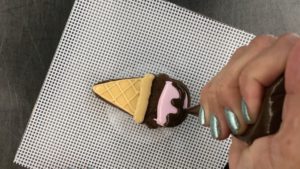
You can do this with all sorts of shapes, like these little lines for sprinkles. If you piped these onto wet icing, they would sink into the icing instead of sitting on top of it.
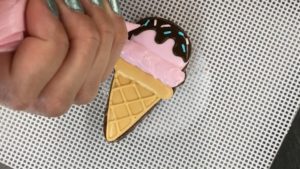
Attach decorations
You can use icing as glue to attach sprinkles to your cookies. After an area of icing has dried, pipe a little dot of icing with a stiff consistency and then press a sprinkle onto it. As the dot of icing dries, it will secure the sprinkle in place.
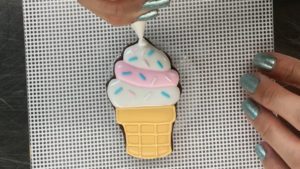
You could press the sprinkle into the base layer of icing on the cookie while it’s still wet, so that the sprinkle sticks onto it and you wouldn’t need to add the dot of icing as glue, but the pressure you use as you push the sprinkle in can make the layer of icing bulge.
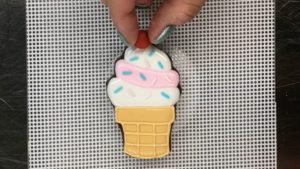
By doing it this way, with a dot of icing as glue, you have more control because you can adjust the sprinkle after pressing it into the dot, shifting it a bit lower or higher before the dot dries and sets the sprinkle in place.
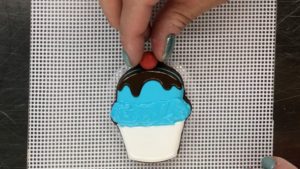
When you finish decorating your cookies, place them in front of a fan to dry completely. The time it takes depends on the humidity but it’s usually a few hours.
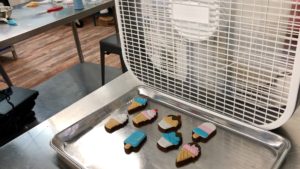
Now I’ll show you a way to use cookies to decorate a cake! While our cookies were drying, I made the most of being in such a beautiful studio kitchen and with this gorgeous mixer I made a batch of my 4 Minute Buttercream frosting.
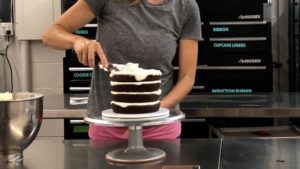
I’m going to place cookies around the sides of the cake after frosting it. To do this, assemble your cake and apply a crumb coat, which is a thin layer of frosting to trap in any crumbs that might come off the cake so they don’t get into the final coat of frosting.
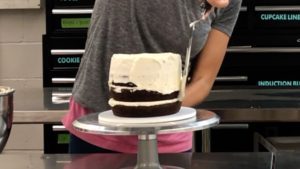
For my final coat I’m going to put sprinkles in the frosting, and after perusing the extensive sprinkle collection in the studio I’m choosing these simple pink and blue jimmies, which I’m pouring into the buttercream and then spreading onto the cake.
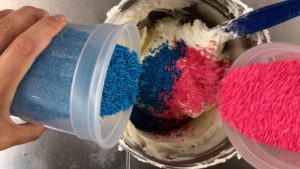
You can press cookies straight into the frosting while it’s still soft and sticky but that can make the frosting bulge around the sides of the cookies. Alternatively, you can chill the frosting to let it set and then use a little bit of plain buttercream to attach the cookies.
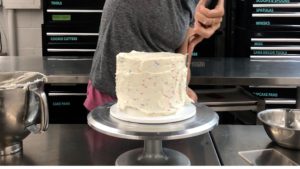
You can do this by spreading a bit onto the back of a cookie and then pressing it against the frosting, and that little bit of buttercream will set and secure the cookie against the side of the cake.
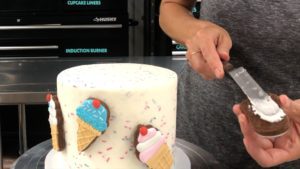
Or you can put the buttercream in a piping bag and pipe it onto the back of the cookie.
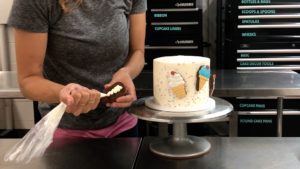
Chef Jossie gave me some cookies and piping bags of royal icing to take home with me, like you’d get if you had a subscription to Sweet Spot’s online cookie decorating classes.
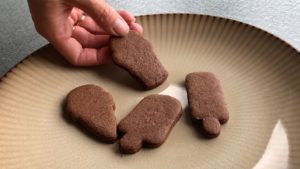
The colours separated in the bags, like she told me they would, but you can squeeze and massage them for a while to get them back to normal. I had bags of thinner and thicker consistency for the different styles of piping and some cute little cookies ready to be decorated.
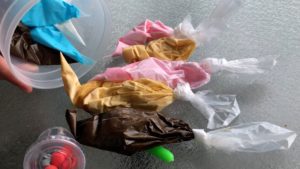
I’d love to tell you that my first attempt at cookies ended up being just as beautiful as hers, but I quickly gave up and gazed out at the pretty view instead. I think I’ll stick to cakes for the moment!
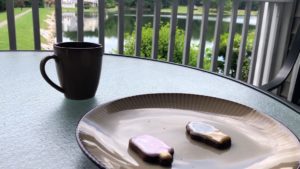
I hope these tips have been useful!
If you’re looking for creative ways to use your cookie cutters, check out my tutorial on 6 Ideas for Cake Decorating with Cookie Cutters.
Here’s the video version of this tutorial:
If you don’t have cake decorating tools or you’re away from home, don’t let that stop you from making a pretty cake! In this tutorial I share how to decorate a cake with no special tools and a hack to create a makeshift
For my cake I’m using my Perfect Chocolate Cake batter, dividing it equally between three 8″ pans. After baking and cooling the cake layers, chill them in the fridge for an hour or in the freezer for 30 minutes. Cold cake layers are much easier to work with because they’re firmer and less crumbly.
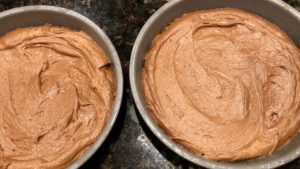
You can leave the cake layers in the fridge overnight if you don’t have time to bake and decorate the cake on the same day. To prevent the cake layers from drying out, wrap them in cling film or saran wrap before putting them in the fridge.
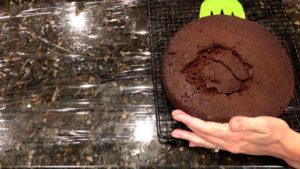
If you’re travelling somewhere with your cake layers to assemble and frost the cake there, check out my tutorial on How To Travel With A Cake In Your Suitcase!
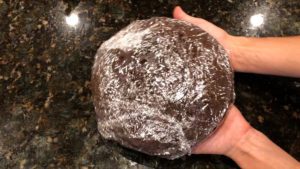
While the cake layers are chilling, make your filling and frosting. I’m using my Best Chocolate Buttercream for this cake for both the filling and frosting but you can use whatever you like. Ganache, meringue buttercreams or even whipped cream will work for the frosting.
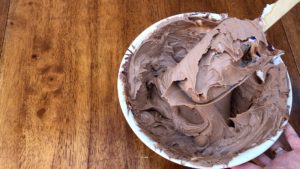
When you’re ready to assemble your cake, take the cold cake layers out of the fridge or freezer and if you wrapped them in cling film or saran wrap, unwrap them now. Don’t worry about any imperfections on the cake surface because they’re all going to be covered with frosting!
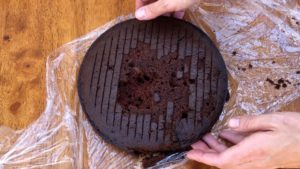
Attach the first one to a plate or platter using a dollop of buttercream spread onto the middle of the plate. This will act as glue to secure the cake so it doesn’t slide around when you frost it.
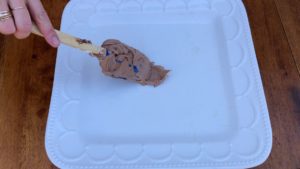
Spoon some buttercream onto the first layer and spread it around to cover the cake, using the back of your spoon. Since the cakes are cold they shouldn’t crumble as you spread the buttercream.
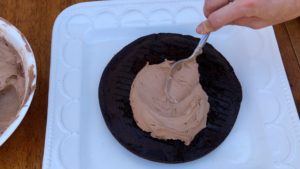
Spread it right up to the edges to completely cover the top of the cake layer, so that the filling on top will eventually meeting the frosting on the sides and lock the moisture into the cake.
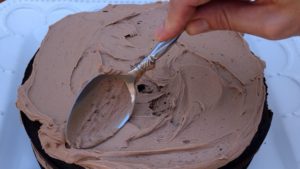
Place another layer of cake on top and continue alternating cake layers and filling. After placing your top cake layer onto the cake, spread buttercream over that as well. This will be the frosting on the top of the cake.

Spread the frosting all the way to the edges of the cake and a little bit beyond, so that it sticks out over the sides of the cake, and this will give you nice sharp edges on your cake instead of a domed top that droops down onto the sides of the cake.
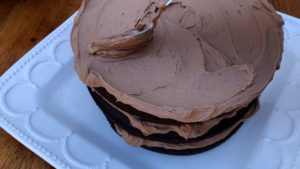
Move onto the sides next. This is a bit trickier because of the angle and also because the sides of the cake tend to have more crumbs than the top. It’s really important that the cake layers have been refrigerated so that they’re cold, because at room temperature cakes are even more crumbly.
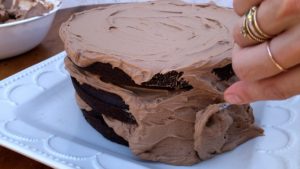
Scoop up buttercream using the back of your spoon and then use that to spread it onto the cake.
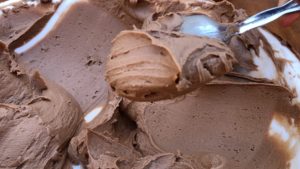
By gliding your spoon from side to side like this, you’ll spread the frosting over the cake without pulling crumbs off. When you need to use your spoon to scoop up more buttercream, swipe the spoon off sideways instead of lifting it straight off the cake, which would pull cake crumbs off with it.
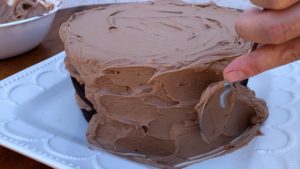
The more buttercream you spread onto the cake, the better, for two reasons. The first is that it’s easier to spread thick buttercream around on the cake, noise reduction and you can easily take some off with your spoon later. If you spread the buttercream on thinly, it’s more likely to pull crumbs off the cake.
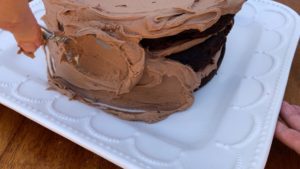
The second reason for spreading the buttercream on thickly is that if you want to smooth the frosting, which I’ll show you how to do next, it’s much easier if the frosting starts out thick.
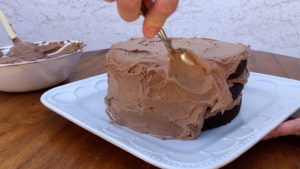
With the back of your spoon, spread the buttercream all the way down to the plate, not worrying around making a mess on the plate with buttercream smudges noise reduction because we’ll tidy that up later. Spread the buttercream all the way up to the top of the cake as well, beyond the top edge to prevent air pockets and to make nice sharp edges later.
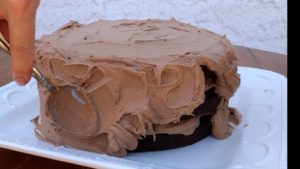
When you’ve spread frosting all the way around the cake, spin it around one more time to check for any areas where the frosting is much thinner or if there are any parts where you can see cake crumbs, and spread some more buttercream over those.
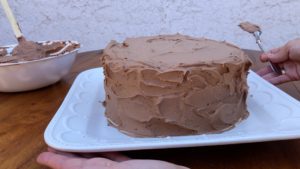
This textured frosting looks pretty as it is, so you can stop at this point if you like and tidy up the plate by wrapping a paper towel around your finger and then wiping around the base of the cake to take off any smudges of buttercream.
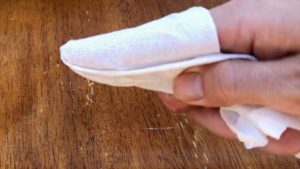
If you like you can add more texture to the top of the cake, like these waves or random swirls or scatter on some sprinkles.
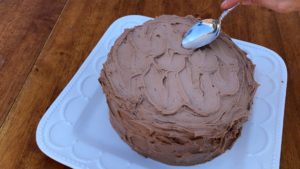
If you want the frosting on the cake to be smooth, you can do that without any special cake decorating tools! I’ll show you the process step by step and also share an easy hack for a
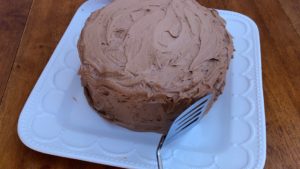
Press the spatula (or whatever object you’re using) against the side of the cake and pull it sideways, using the end of the spatula to scrape the frosting. You’re not pressing the entire surface of the spatula against the cake, just the edge.
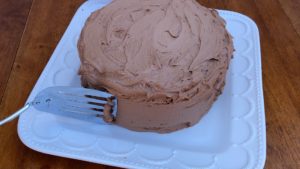
Don’t worry about these strands of buttercream coming through the gaps in the spatula because they’ll come off later in the smoothing process. A spatula without these gaps would be even better to use but you’ve go to work with what you have!
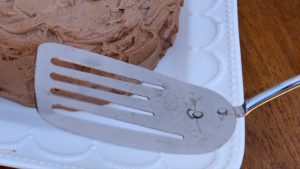
To spin the cake more easily as you smooth the frosting, here’s an easy hack if you don’t have a
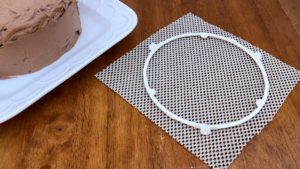
Place your cake plate or platter on top and although it won’t spin around effortlessly like it would on a cake decorating
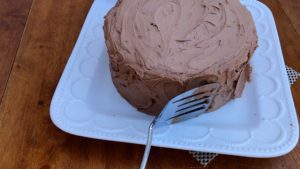
Scrape around the cake a few times with your spatula or whatever tool you’re using. Wipe your tool off on a towel or paper towel after each scrape so that you don’t drag buttercream back onto your smooth frosting.
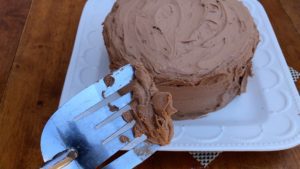
If the cake is taller than your tool you’ll have to go around the bottom section once and then lift the tool an inch or two higher and go around again to smooth the top section.
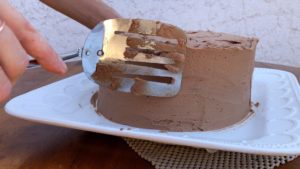
You can definitely do this without the
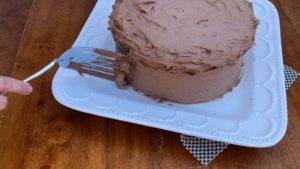
If your tool doesn’t glide around the cake in a smooth motion, and instead it jerks or jumps or stops and starts along the scrape, you’ll get dents in the frosting at those points and you’ll have to scrape over that section again to get it smooth.
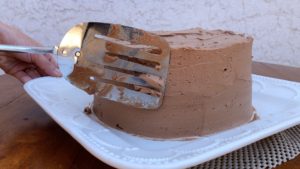
As you go, check to see if the cake is showing through the frosting anywhere and spread a bit more buttercream over those areas and then scrape again and again until you’re happy with the sides.
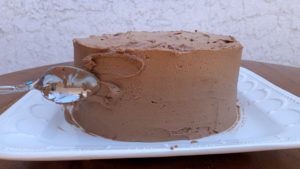
For the top of the cake, lower your spatula down onto the cake starting just outside the cake and pull it towards the middle of the cake. Press down slightly on the frosting to create a 90 degree angle like a corner going over from the top of the cake down to the side.
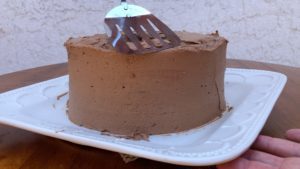
If you spread buttercream up over the top of the sides of the cake, as you scrape over the top edge now you won’t have any air pockets. If you do see any air pockets, if they’re shallow you can scrape over it again to get rid of it but if it’s deep and stubborn and won’t disappear after a few scrapes you can spread more buttercream over the air pocket to fill it in and then scrape over it again.
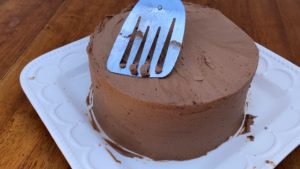
Remember to wipe the underside of the spatula clean after every scrape so that you don’t drag any dregs of buttercream onto your nice sharp edges.
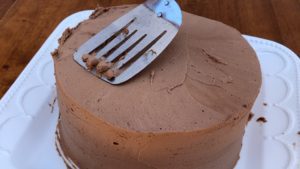
When you finish smoothing the frosting, wrap your finger in a paper towel to wipe any buttercream smudges off the plate. Try not to touch the frosting on the sides of the cake but if you do, don’t worry because we’re going to cover up the bottom inch or so of the frosting.
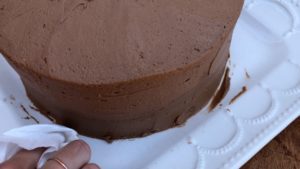
After cleaning the plate, pour sprinkles around the cake and use your hand or the back of your spoon to press the sprinkles into the frosting. This makes a colorful border around the bottom of the cake.
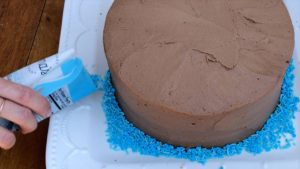
Because you’ve just frosted the cake, the buttercream will still be soft and sticky so the sprinkles will stick to the frosting easily. If you have extra sprinkles left on the plate you can leave them there or wait for the buttercream to set and then brush or tip the sprinkles off the plate.
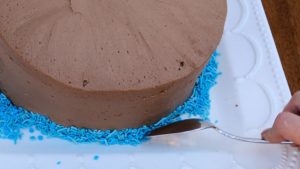
To add some detail to the top of the cake, put some leftover buttercream into a ziplock bag and cut a corner off, which you’ll be squeezing the buttercream out of.
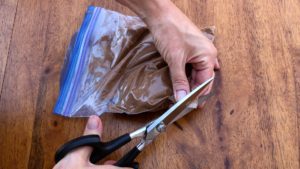
The line you cut across the corner should be about as wide as your thumb. If it’s much bigger or much smaller it will be difficult to pipe a neat dollop.
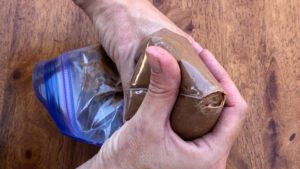
Hold the cut corner just above the cake, slightly in from the edge of the cake, and squeeze the buttercream out of the bag. It will bulge out to form a blob and then as you lift the bag up and away from the cake, release your pressure on the bag so that the buttercream makes a neat point.
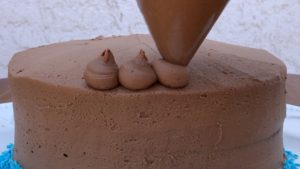
These dollops of buttercream would be neater and more symmetrical if you used a piping bag and a round piping tip but this way works and you’ll hardly notice any imperfections when the cake is finished.
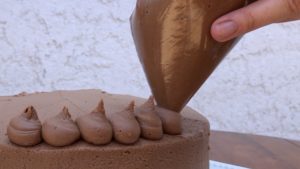
Add a few sprinkles to make the cake more festive and the cake is finished! No one will guess that this pretty cake was whipped up in just a few minutes, with no special tools!
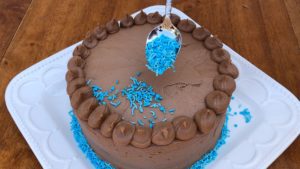
You can store this cake at room temperature or in the fridge. If you refrigerate it, take it out of the fridge 2-4 hours before serving. This gives it enough time to come to room temperature (when it tastes best!) but it’s not so long that the frosting or decorations droop. When you serve the cake, wipe your knife clean after each cut for the neatest slices.
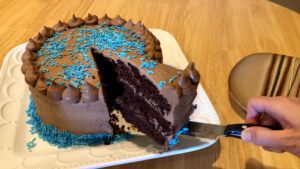
Of course, a delicious cake will be appreciated whatever it looks like, but I think cakes taste even more delicious when they look pretty, too! I’d love to see your cake decorating without tools and with this
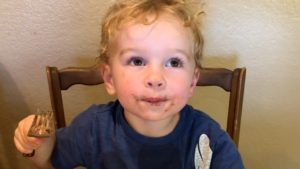
Here’s the video version of this tutorial:
This buttercream is decadently chocolatey because it’s made with two different kinds of chocolate: melted chocolate and cocoa powder. It’s easy to make, stores well, and can be used for all sorts of frosting and decorating techniques!
This recipe makes 6 cups of buttercream, which is enough buttercream to fill and frost an 8″, 9″ or 10″ cake. If you halve the recipe you’ll have enough buttercream to fill and frost a 6″ cake.
Ingredients
1/3 cup (35g or 1 oz) unsweetened cocoa powder
1/4 cup (60ml) hot water
3/4 cup (175g or 6oz) semisweet chocolate
2 1/2 cups (565g or 20oz or 5x4oz sticks) unsalted butter*
907g or 32oz (about 7 cups) powdered sugar
1/2 teaspoon salt
1/2 tablespoon vanilla extract
*If you use salted butter, omit the salt in the recipe
Method
Mix cocoa powder with hot water and stir until all of the cocoa powder has dissolved, to make a thin paste almost the consistency of melted chocolate. Leave it to cool.
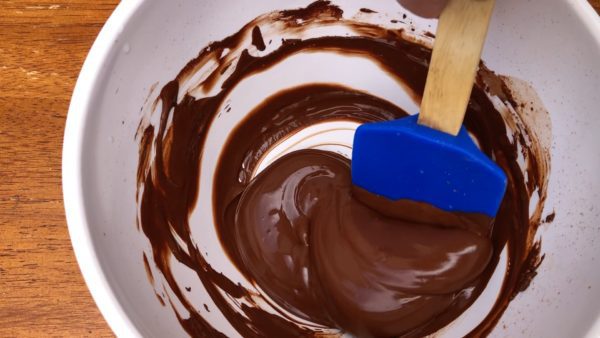
In a small microwave-proof bowl, measure out chocolate. You can use chocolate chips or chop up a bar of chocolate into roughly the same sized pieces so they melt at the same speed. Melt the chocolate in the microwave at 50% power for 1 minute and stir it until it’s smooth.
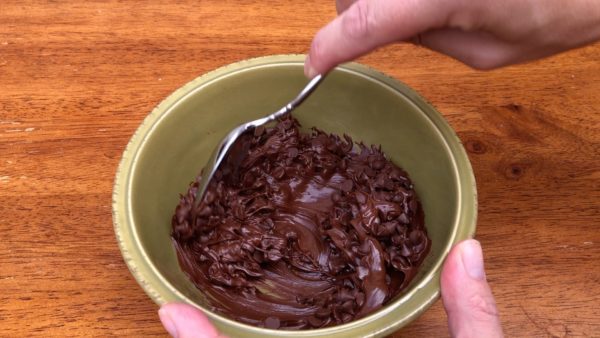
After stirring it, if there are still pieces of solid chocolate in it, melt it for another 30 seconds. When it’s smooth, leave it to cool.
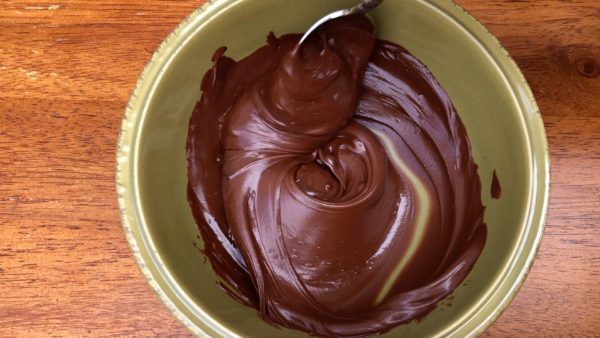
Make a batch of my 4 Minute Buttercream by mixing butter and powdered sugar in a mixer at the lowest speed setting until it’s smooth. The butter must be at room temperature and I like to add the sugar a quarter at a time, mixing for 1 minute before adding the next quarter, so that the sugar doesn’t spray out of the mixer when you turn it on. Add vanilla and salt and mix for a few more seconds to incorporate.
Add the cocoa powder mixture and melted chocolate to the buttercream and stir everything together.
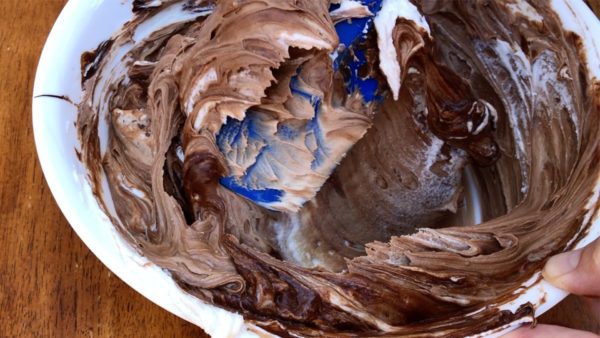
The buttercream should be silky smooth and easily spreadable. If it’s too stiff and it pulls off the cake when you try to spread it on, add milk or cream a tablespoon at a time until it’s the right consistency. I have a very detailed tutorial on my 4 Minute Buttercream with tips on how to check the consistency.
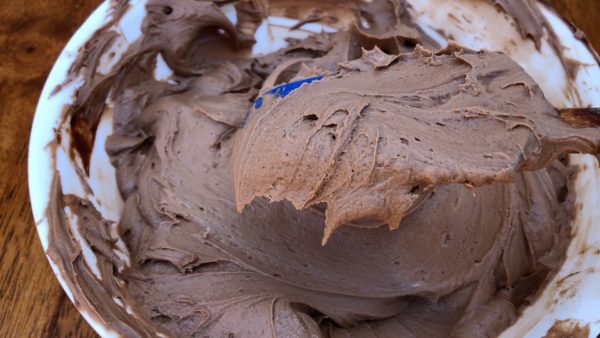
You can use this chocolate buttercream to frost a cake and I’ll give you some fun variations on frosting techniques with this chocolate buttercream in a moment.
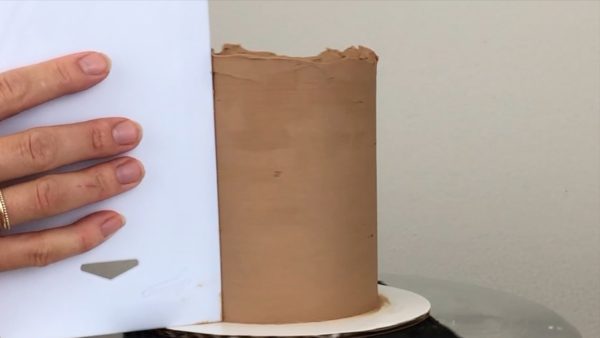
This chocolate buttercream also pipes well so you can use it with a 1M piping tip to pipe swirls or ruffles onto cakes or cupcakes to add texture and height to a cake like this:
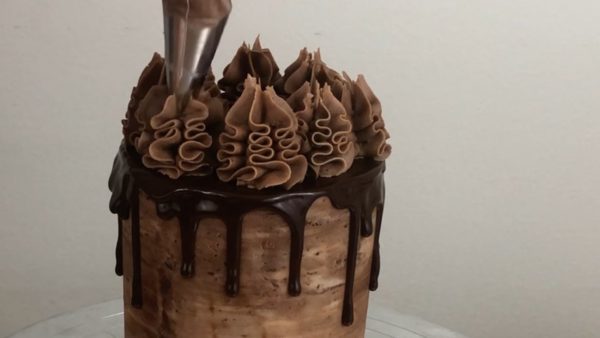
I love piping filling when I make mini cakes, using textured designs to add detail to the filling to make pretty naked cakes that don’t need frosting:
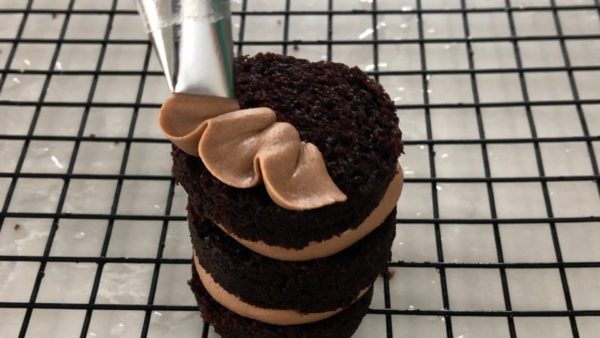
You can pipe borders with this chocolate buttercream using a star tip like a 1M tip or an open star tip like a 4B tip:
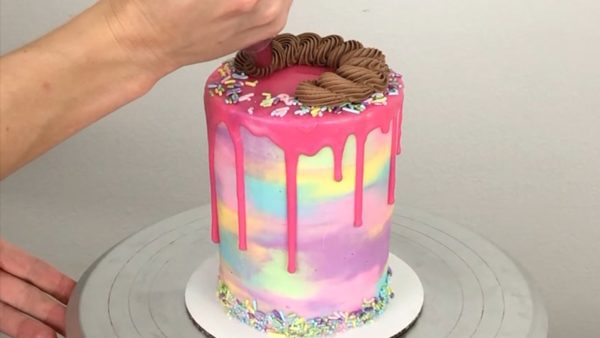
It even works for buttercream carving and I have an entire online course on Buttercream Cake Carving.
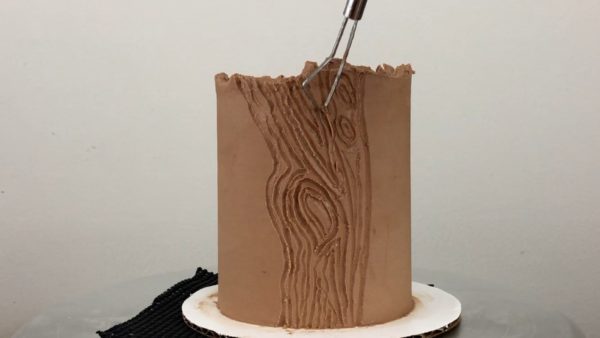
Brown buttercream might sound like a boring base for cake decorating but you can jazz it up by creating an ombre or watercolor effect. For a watercolor effect, don’t mix the chocolate into the buttercream completely. Mix the cocoa powder and water mixture in first, to give the frosting a pale brown colour, and then pour the melted chocolate into the bowl but only stir it a few times to create a marbled look.
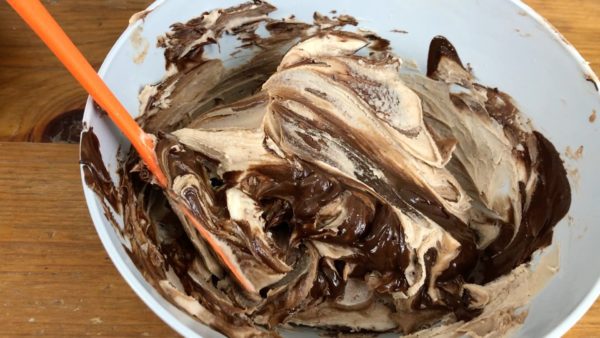
Spread the frosting onto your cake and you’ll notice lots of different shades of brown in the frosting.
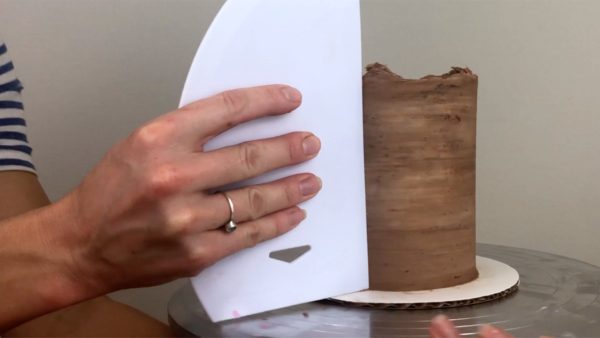
When you scrape the cake with a frosting smoother you’ll take away the texture on the frosting and when the frosting is smooth, the watercolor effect will be even more dramatic!
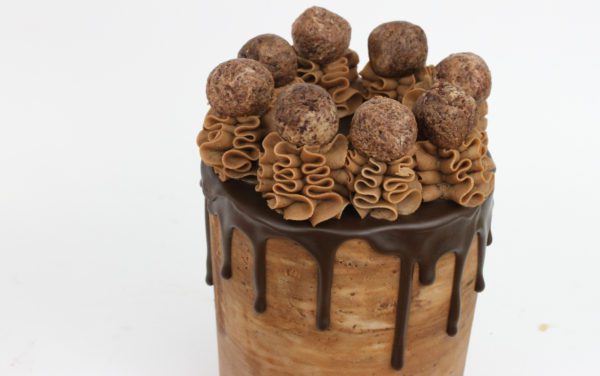
To change the shade of brown of your frosting, play around with the amount of chocolate you add to the buttercream. Divide your buttercream between bowls and add different amounts of melted chocolate and the cocoa powder mixture to each bowl.
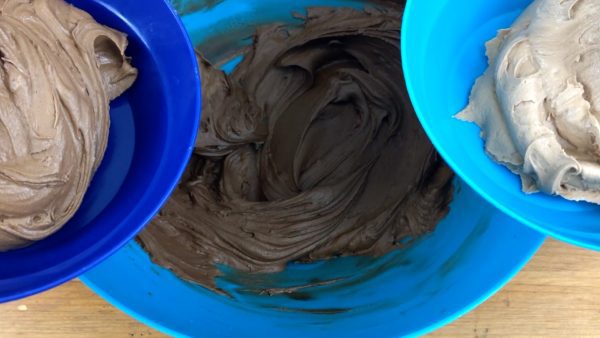
You can use these different shades of brown to vary the colours of chocolate buttercream filling between cake layers, or create a pretty ombre design on a cake!
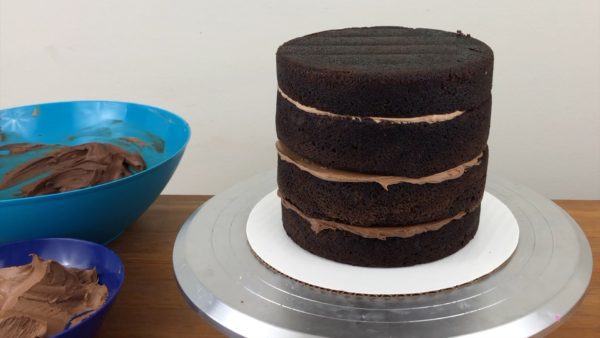
For ombre frosting, spread different shades of chocolate buttercream in layers around the sides of the cake so that the colour gets lighter or darker as you go up or down the cake. The bands of colour don’t have to be neat with a straight division between each colour. By overlapping the colours you’ll blend the shades of brown together, creating a more gradual gradient from light to dark brown.
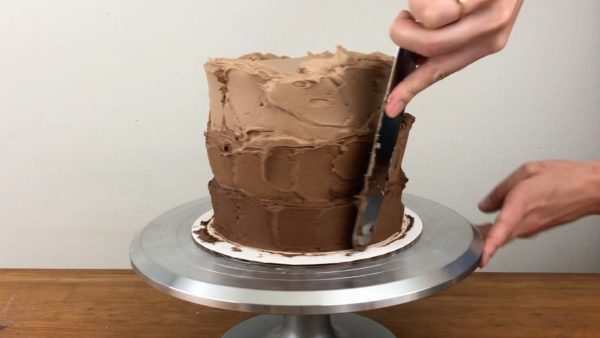
After each time you scrape around the cake with a frosting smoother, wipe the buttercream off your frosting smoother and use it to fill in any air pockets around the cake. By using this mix of colours four your touch-ups, you’ll create less distinct divisions between the colours so that they blend together even more gradually.
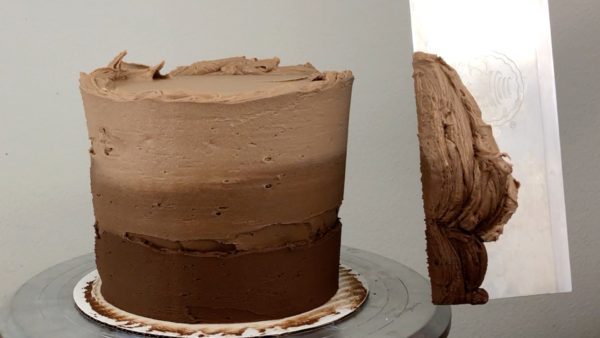
You can smooth the frosting with a frosting smoother or add texture with a textured cake comb like this pleated one, and the chocolate buttercream makes a cake that’s beautiful as well as delicious!
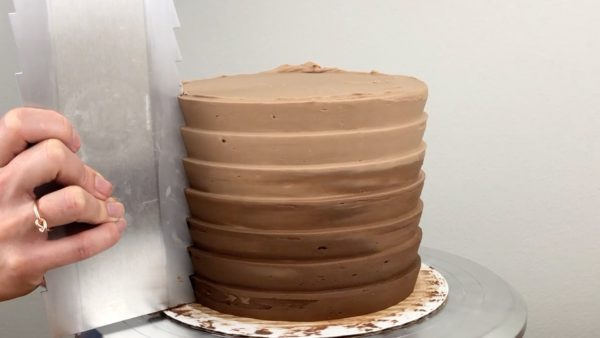
I store frosted cakes in the fridge until 2-4 hours before serving. To store just the chocolate buttercream, cover the bowl tightly with cling film or put the buttercream in an airtight container and leave it at room temperature for up to 3 days or in the fridge for a week or in the freezer for a month.
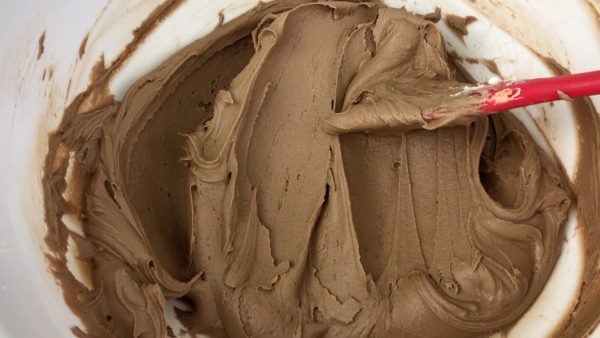
Take chocolate buttercream out of the fridge or freezer a few hours before you use it so that it can warm up to room temperature. Then stir it to get rid of any air bubbles. If there are any cold lumps of buttercream, leave it out for another hour and then stir it again. When it comes to room temperature, previously chilled chocolate buttercream will behave exactly the same way as freshly made buttercream!
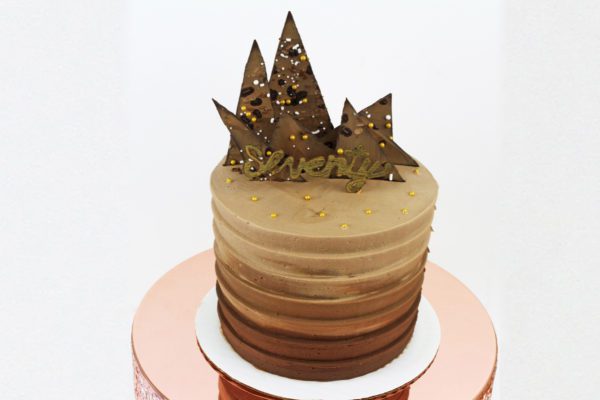
Another option for chocolate frosting is chocolate ganache and I have a detailed tutorial on 4 Ways To Use Ganache.
If you’re looking for more information on how to make, troubleshoot, colour, store, and decorate with buttercream, check out my online course on The Basics of Buttercream.
I’d love to see the cakes you make with this chocolate buttercream frosting! Please tag @britishgirlbakes in your photos on instagram so I can see your creations!
Here’s the video version of this tutorial:
Mini cakes are perfect for mini celebrations! They’re also fun gifts if you want to give each person their favourite flavour or personalised decorations. In this tutorial I’m going to show you how to bake mini cake layers without special tools and how to assemble and frost such tricky little things, and then I’ll share a few ideas for decorating them. If you prefer to watch a video of this tutorial, scroll to the bottom of the page.
There are lots of ways to make mini cakes and I have tutorials on how to turn cupcakes into cake and how to make them in special mini cake pans but the quickest way is to bake a sheet cake.

This is a 9 x 13” pan and this is the 6” batch size of my perfect chocolate cake. You can use any cake recipe and any size or shape of pan and I’ll show you some examples of that later in this tutorial.

This is a 3” cookie cutter which is about the width of a cupcake, just to give you an idea of the size of these, but with three layers these mini cakes are going to be much taller than a cupcake.

To frost mini cakes it’s essential to use cold cake layers. You can put them in the fridge for about an hour to chill them or if you like you can put them in a ziploc bag and freeze them for up to a month before you make and decorate your cakes.

It’s easiest to add filling to your cakes by piping it onto the cake layers because the cakes are so tiny that it’s tricky to hold them still while you spread filling onto them. From my sheet cake I cut out 12 circles, which makes 4 mini cakes of 3 layers each.

Once your cakes are assembled they’re ready to be frosted! But first, you have to secure each one to a cake board. For these 3 inch cakes I use 4 inch cake boards, which are just big enough for the frosted cakes.

Spread or pipe a little dollop of buttercream onto the middle of the cake board and then press your mini cake down onto it. When the buttercream sets it will act as glue, sticking the cake to the board.

If you prefer, you can do this at the beginning, putting a dollop of buttercream on the cake board and then press your first layer of cake onto the board and assemble it there, alternating cake and filling right there on the board.

I want to show you another way to assemble mini cakes and decorate them at the same time! Attach your first layer of cake to a cake board with a dot of buttercream.

Put buttercream in a piping bag fitted with a piping tip and pipe the buttercream onto the cake, giving the filling a pretty shape and texture. I’m using a 1M star tip to pipe these little orange stars.

Place the next layer of cake on top and then pipe on the next layer of filling. Only the outer edge of the filling will be visible, so it’s a good idea to start there and work your way in so that you focus on the neatness of the piping on the outer edge.

If you start in the middle and work your way out, you’ll be guessing on how to space the piping so that you end up right at the edge of the cake, and that’s why it’s easier to start at the edge. This is a 199 open star tip.

I’m using a petal tip to pipe a flower on the top of the mini cake. By adding these piped details to the filling of the cake you’re adding a decorative touch now, while assembling the cake, which means you can present this as a naked cake and skip the frosting step if you want to.

You can use any shaped cookie cutter to cut shapes out cake layers of any shape or size. For example, I cut these mini cake layers out of 6″ vanilla cake rounds using star shaped cookie cutters.

Frosting such a small cake with this star shape with its many angles and sides would be tricky! Piping textured filling between the layers to make a naked mini cake is a quicker and easier alternative.

The challenge with frosting mini cakes is the size and weight of the cake. Because they’re so tiny and lightweight, you have to do something to prevent them sliding around on the

The first trick for frustration-free frosting is to use a non slip mat, which stops the cake from moving around on the

The second trick is to spread or pipe that dollop of buttercream onto the cake board. It sticks the cake to the cake board, so that that cake doesn’t slide around on the board.

This only works if the cake is cold, which is the third trick. Having a cold cake makes the buttercream dollop set so that it holds the cake firmly in place when you apply pressure to it as you frost it. Having cold cake layers also means that the filling will set quickly and hold the higher cake layers in place, so when you frost the cake the cake won’t fall over.

The fourth trick is to make sure your buttercream is the right consistency. If it’s too stiff, like this is, it will pull off the cake when you try to spread it on.

Add a bit of milk or cream to make it thinner and it will be much easier to spread onto your cake as you frost it.

Start with a crumb coat, which is a very thin layer of frosting to trap in any crumbs that come off the cake so that they don’t get into the final coat of frosting.

After you’ve crumb coated your mini cake you can freeze it for up to a month wrapped in 2 layers of cling film or Saran Wrap, or leave it in the fridge overnight, or you can move straight on to decorating it.

You can frost these mini cakes normally and the non-slip mat or ring of masking tape will hold them in place.

Or you can avoid smooth frosting and instead you can cover them with piping using a 1M star tip like roses or piped designs using a petal tip like ruffles.

Here’s the video version of this tutorial:
Cookie cutters are wonderfully versatile tools which can be used for much more than just cutting out cookies! In this tutorial I’m going to show you 6 ideas for cake decorating with cookie cutters, using them to cut shapes out of cake, chocolate, and candy melts as well as cookies. These techniques will change the shape of cakes, decorate the frosting, or create cake toppers. If you prefer to watch a video of this tutorial, scroll to the bottom of the page.
To make mini layer cakes, use cookie cutters to cut shapes out of larger sheet or round cakes. You can use round cookie cutters or shapes, like stars. Press your cookie cutter into a cake layer, arranging it to get as many shapes out of each layer as possible. The layers should be thinner than the height of your cookie cutter for the neatest shapes.
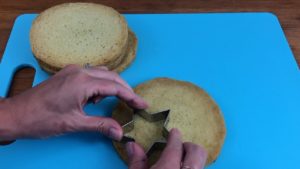
Attach the bottom layer to a cake board or a plate with a dollop of buttercream. When the buttercream sets it will act like glue, holding the cake in place even if you move it around.
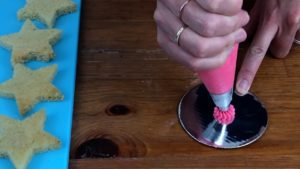
You can spread or pipe filling onto each layer. Here I’m using a 4B tip to pipe little open stars of my 4 Minute Buttercream as filling between each layer of cake.
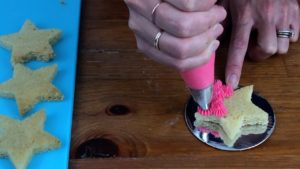
I’m leaving this cake naked, without frosting on the sides, so that the pretty piped filling is visible. A few sprinkles on top add a nice touch of colour and texture.
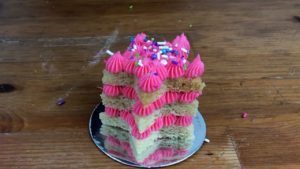
To prevent a naked cake from drying out, put it in the freezer for 30 minutes just until the frosting has set and will hold its shape and then wrap the whole cake in cling film. Put it in the fridge until 1 hour before serving and then take the cling film off as soon as you take it out of the fridge so that when the frosting softens, the cling film won’t damage it. It’s best to keep it in something airtight until serving it, like a Tupperware.
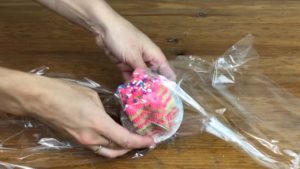
Smooth frosting is tricky on shaped cakes, especially when they’re this small so if you want to frost it, it’s easier to pipe the frosting on. If you’re looking for ideas, I have a tutorial on 8 Ways To Use A 1M Piping Tip and 8 Ways To Use A Petal Tip.
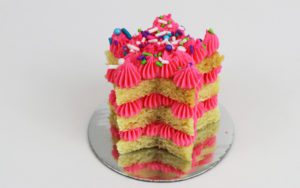
Another way to cut cakes with cookie cutters is to create a piñata or sprinkle explosion cake. After your cake layers are baked and cool, use a round cookie cutter to cut a circle out of the middle of all of your cake layers except the top one.
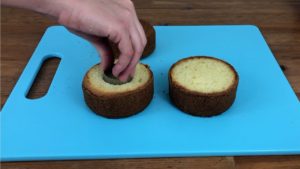
Attach your first layer of cake to a cake board or place using a dollop of buttercream to secure it. Spread or pipe your filling onto your first layer, going around the hole in the middle. Press you next layer of cake on top and repeat.
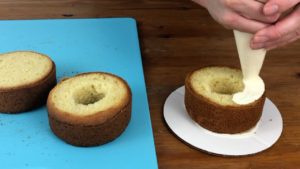
Before placing the final layer on top you’ll have an open chamber in the middle of the cake. Pour sprinkles or candy into it, going right up to the top to fill it, and then place the final layer of cake on top. This layer seals the chamber to provide a flat surface to frost over.
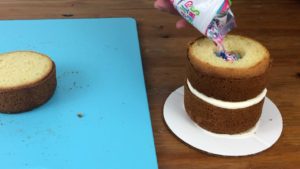
Frost the cake as normal and decorate it however you like. Pink or blue sprinkles are fun for a gender reveal or you can match the colours of your sprinkles to the colour scheme of the cake.
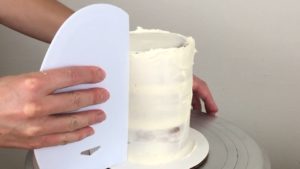
Use a sharp knife to cut into the cake, making sure your slice reaches all the to the middle of the cake. When you lift the first slice out the sprinkles will explode out of the cake.
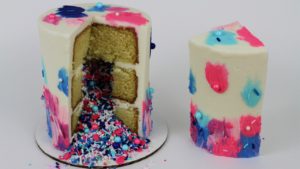
You can make delicious chocolate shapes using cookie cutters and there are two ways of doing this. The first is to melt chocolate and you can tint it by adding gel colours. I melt chocolate at 50% power in the microwave for 1 minute at a time so that it doesn’t melt or seize.
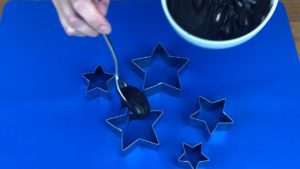
Arrange your cookie cutters on a silicone mat or parchment paper and spoon the chocolate into the cutters, pushing the chocolate right up to the edges. The thicker the chocolate is, the less fragile the shapes will be when you push them out of the cookie cutters later.
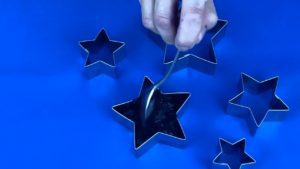
To add some quick colourful detail to the chocolate shapes, scatter some sprinkles or edible glitter onto them straight away, before the chocolate sets. Leave them for a few hours to harden or put them in the fridge to set more quickly.
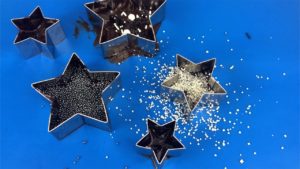
Push each chocolate shape out of the cutter, pressing all over the shape to ease it out little by little so that it doesn’t snap. It’s a good idea to make a few extras, just in case!
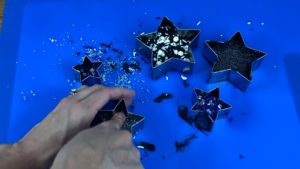
These thick chocolates make sturdy cake toppers and you can attach them to a cake by piping swirls onto the cake with buttercream. When the buttercream sets it will secure the toppers in place.
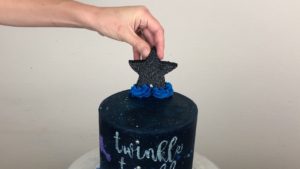
To decorate the sides of a cake with chocolate shapes it’s best to use thinner shapes which don’t weigh as much. You can use the same technique as for the stars in the example above but if the shapes are then thin they’re more likely to snap when you push them out of the cookie cutters.
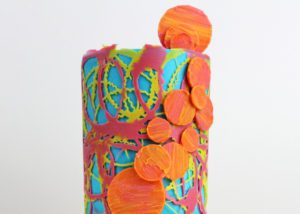
Spread the melted chocolate or candy melts onto parchment paper or a silicone mat using an
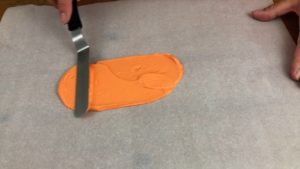
If you dip your cookie cutters into hot water before cutting out the shapes you’ll need less pressure and you’ll get a smoother outline on your shapes.
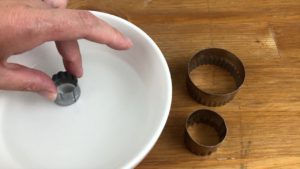
Press a cookie cutter into the chocolate or candy melts once they’ve set and twist it to cut the shape out. The shapes might lift up with your cookie cutter and if that happens, just push them back out and set them aside. Cut out a few more shapes than you need in case any break and dip your cookie cutter in hot water before each cut.
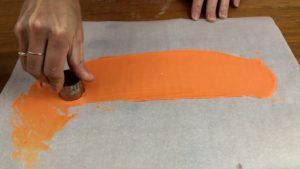
If your shapes stay attached to the parchment paper or silicone mat, lift up the surrounding chocolate or candy melts to leave just the shapes behind. Then pick those up or slide an
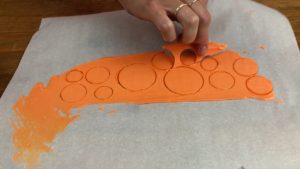
Attach the shapes to your cake by piping or spreading dots of buttercream onto the frosting and pressing the shapes into them. You could use melted chocolate to attach them if you prefer. Once the buttercream or melted chocolate sets, the shapes will be secure on the cake while it’s chilled and for a few hours after coming out of the fridge.
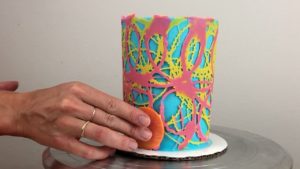
To add some height to your cake you can make cookie toppers on sticks. I’m using sugar cookie dough for these but you can use whatever recipe you like, as long as it will hold its shape. I leave the baking powder out of my recipe so that they don’t spread out while they’re baking.
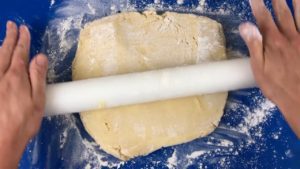
Roll out the dough and cut out shapes with cookie cutters. Arrange them on a baking tray lined with parchment paper, leaving about an inch between cookies in case they spread out while they’re baking.
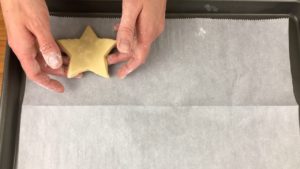
Push a paper lollipop stick or cookie pop stick into each cookie, going in only about a centimeter or half an inch. I freeze the cookies before baking them and this also prevents them from spreading out as they bake.
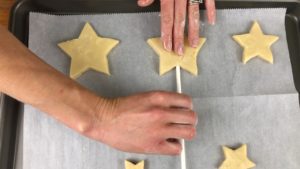
Once the cookies are cool you can decorate them with royal icing or make a glaze with powdered sugar and a few drops of milk. You can tint this with gel food colours if you like.
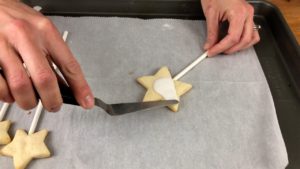
For a fun sparkly effect, after spreading royal icing or a sugar glaze onto a cookie you can dip it in a bowl of edible glitter or sprinkles.
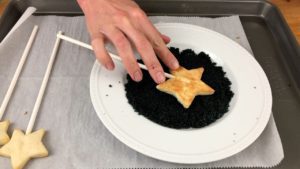
Another way to decorate the cookies is to use the same cookie cutters that you use to cut the cookies, to cut out thinly rolled fondant. Stick the shape to a cookie by brushing the back of the fondant with a paintbrush dipped in water.
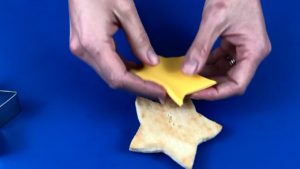
The sticks you baked into the cookies will support the cookies if you push them into a cake, so that they stand upright without falling over.
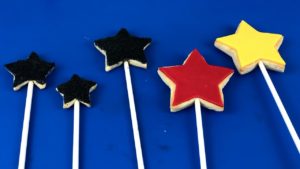
To decorate your cake with the cookies, make sure the sticks are shorter than the height of the cake and push them straight down into the cake.
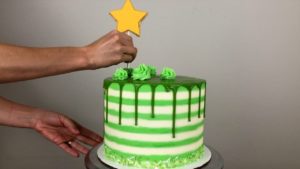
You don’t have to push the sticks all the way down to the bottom of the cake. Try varying the height of the cookie toppers so they’re all visible.
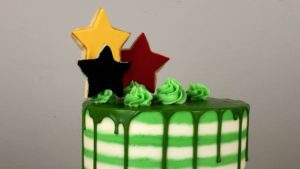
Use cookie cutters as guides for piping shapes onto cakes. After frosting your cake, press a cookie cutter into the frosting to leave an imprint. You can do this on the sides and the top of the cake.

I like to do this after chilling the cake so the frosting has set and you don’t accidentally damage it by smudging it with your finger. Also, the outline you leave when you pull the cookie cutter off will be neater if the frosting has set.
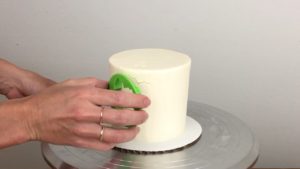
Pipe over the imprint of the cookie cutter, using it as a guide to trace over. This works best with buttercream that has been thinned out with a bit more milk or cream than normal. Use a piping bag fitted with a small round tip like a #2 or #4, depending on how thin and intricate you want the design to be.
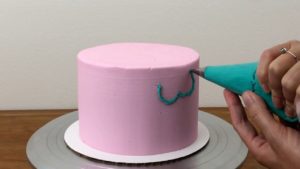
For this design wiggled the piping bag slightly as I piped to give the impression of lace. You might choose to only pipe the outline of the shapes or you can fill it in with freehand patterns.
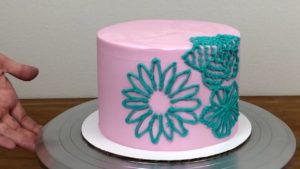
For this cake, after piping over the outline of the cookie cutters I’m using an
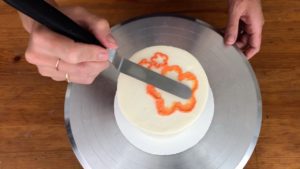
You can pipe onto the top and sides of the cake and even make shapes fold over the top edge of the cake to cover both the top and the sides. Try adding sprinkles or edible glitter for more detail!
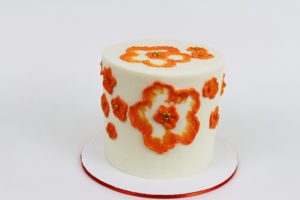
With cookie cutters you can create stencils to make these perfectly neat coloured shapes or sprinkled shapes on cakes.
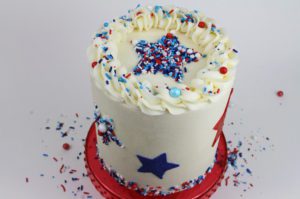
Trace around cookie cutters onto parchment paper or wax paper. If you trace more than one shape or size of cookie cutter, leave a few inches around each shape so that you can make separate stencils.
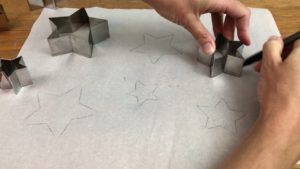
Cut the shape out, folding the shape down the middle so that you can make a small cut and then stick one of the blades of your scissors through that cut to reach the outer edges. Leaving the paper intact beyond the outline of the shape, which you’ll use as a stencil.
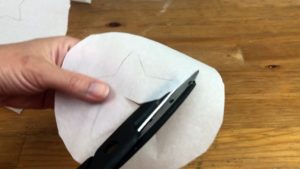
Chill your cake for at least an hour in the fridge so the frosting sets and holds its shape. When you take it out of the fridge, if the room you’re decorating in is warmer than the fridge you’ll get a tiny bit of condensation on the frosting which will allow the parchment stencils to stick to the sides of the cake. Use an
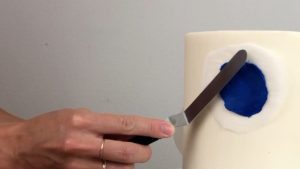
When you peel the parchment off you’ll leave behind perfect coloured shapes!
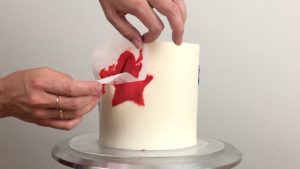
To make sprinkled shapes, spread frosting over the stencil and then scoop up handfuls of sprinkles to press onto the frosting so that they stick.
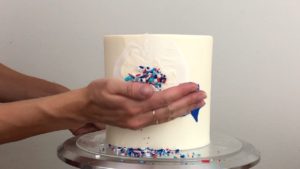
For sprinkled shapes on the top of the cake you don’t need to use parchment paper. Place a cookie cutter on top of the cake, pour some sprinkles into it and press the sprinkles down so that they stick to the frosting
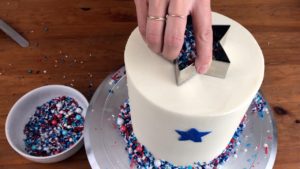
Lift the cookie cutter up to leave the sprinkled shape behind!
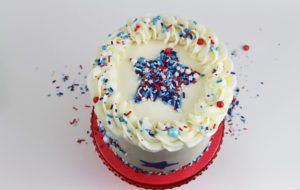
I hope this tutorial has been helpful! If you use any of these techniques to decorate your cakes, please tag @britishgirlbakes in any photos you share on Instagram so I can see your creations! For more ways to decorate cakes check out my online course on 10 Cake Decorating Techniques.
Here’s the video version of this tutorial:
In this tutorial I’m going to show you how to decorate this cheerful striped rainbow cake with a rainbow drip! If you prefer to watch a video of this tutorial, scroll down to the bottom of the page.
Cover your cake with a crumb coat of frosting to trap in any crumbs that might come off the cake. It doesn’t need to be perfectly smooth and it’s fine if you can see the cake through the frosting because we’re going to completely cover it up.
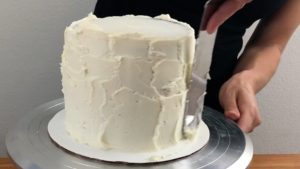
Although it doesn’t need to be perfect, the crumb coat should give the cake the shape you want, with straight sides and a level top. Let the crumb coat set for at least an hour at room temperature. I put mine in the fridge for 30 minutes.
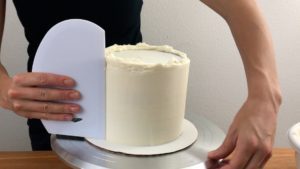
Press a striped cake comb against the side of the cake in a few places to imprint the grooves of the comb, so you know where the stripes will eventually be on the cake. Each little line indented in the cake will be a different colored stripe at the end.
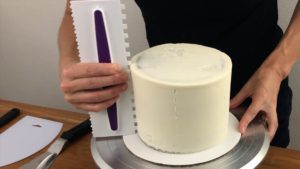
Use these imprinted lines as a guide to spread your colours of buttercream around the cake, making sure you have a different colour going over each of the lines. I’m using my 4 Minute Buttercream and I used gel colours to tint small bowls to make 9 different rainbow shades.
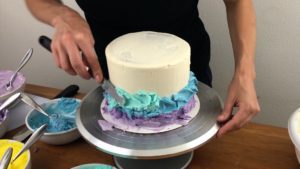
You could pipe the buttercream on instead of spreading it, but since I have 9 colours I’d need 9 piping bags and that’s a lot of washing to do afterwards, so I’m using my
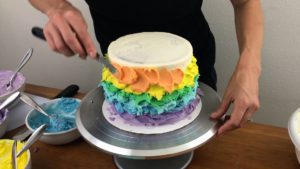
When you’ve covered the whole cake in bands of colored buttercream, smooth the frosting by scraping around the cake a few times with a frosting smoother. If you’re looking for variations on striped designs, check out my tutorial on 4 Secrets for Perfect Stripes on Cakes.
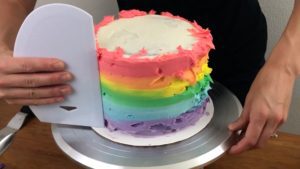
Wherever there are air pockets in the frosting, spread on some more buttercream of that colour to fill in the gap. This rainbow frosting doesn’t have to be perfectly smooth but the smoother it is, the fewer touch-ups you’ll have to do after using the striped cake comb.
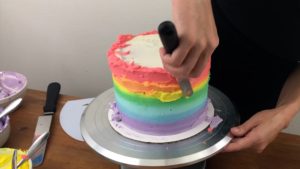
Scrape around the cake again to smooth the frosting and when the frosting is not perfect but fairly smooth, switch to your striped cake comb. Rest the base of the comb on the cake board and press it gently against the side of the cake and then spin the
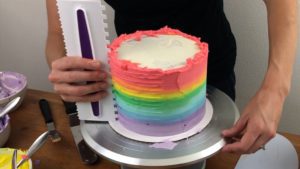
Scrape any buttercream off your cake comb into an empty bowl and save this for piping the 1M swirls on top of the cake later.
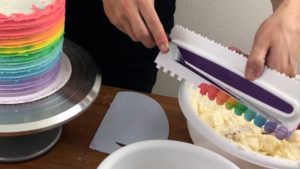
After scraping around the cake a few times with your striped cake comb you’ll probably have several air pockets in the stripes. Fill them in by spreading on some more buttercream of that colour.
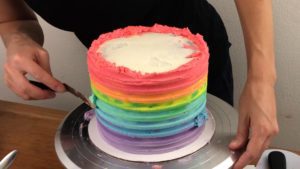
Scrape again and again with your striped cake comb, touching up whenever you notice air pockets, until the stripe grooves are clear and smooth.
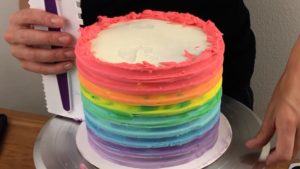
Tidy up the top edge of the frosting with an
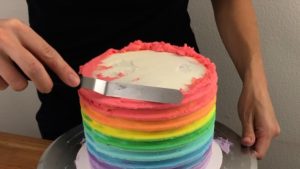
Meanwhile, fit a piping bag with a star shaped tip like a Wilton 1M tip. Now we’re going to use up the rainbow buttercream you scraped off the cake with your frosting smoother and striped cake comb.
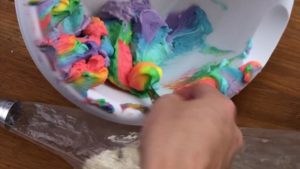
I’m filling half of my bag with plain white buttercream and then other half with the blended rainbow buttercream but you can use only the rainbow buttercream if you like. Set this aside for some finishing touches at the end.
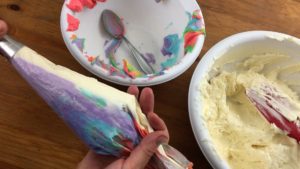
When the frosting on the cake is chilled and firm, take the cake out of the fridge and spread white buttercream all over the cake to fill in the stripe grooves. You’ll spread it all over the rainbow stripes too but that’s fine, we’ll tidy everything up in a minute. Spread quite firmly to push the buttercream all the way into the grooves so there aren’t any air pockets.

Cover the top of the cake as well and now it’s time to reveal the rainbow stripes! Scrape around the cake with your frosting smoother, which will start to smooth the frosting and take off some of the excess white buttercream.
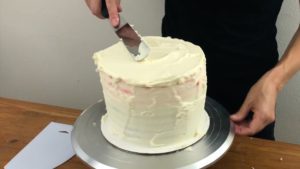
Keep scraping again and again, which will take off a little bit more buttercream with each scrape. The rainbow stripes will be very subtle to start with as they begin to show through the frosting, and they’ll have lots of white patches within them, but with each scrape they’ll get clearer and neater.
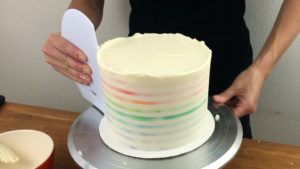
If you pressed your striped cake comb into the crumb coat before you started and used those indents to guide where you spread or piped the colored buttercream, you’ll end up with a different colour for each stripe but the colours will fade through each other like a rainbow, blending together nicely.
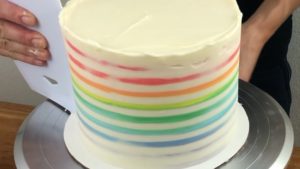
Tidy up the top edge with an
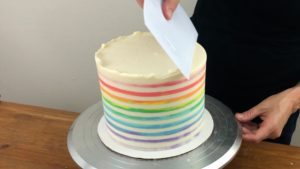
If you want to give the cake a sprinkled border around the bottom, it’s easiest to do this now before the frosting sets completely. Place the cake on a baking tray or hold it above a large cake pan and pick up handfuls of sprinkles, pressing them into the bottom inch or so of the cake.
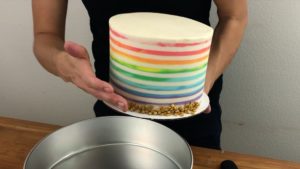
The white frosting will be sticky because it’s still fresh and soft, but the coloured buttercream has been chilled so it won’t be sticky anymore so you’ll have to press quite firmly for the sprinkles to stick to it. Now put the cake back in the fridge to set the frosting again.
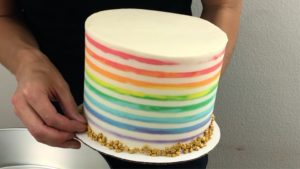
For the drip you’ll need lots of bowls. You can use candy melts or white chocolate for this. If you’re using candy melts, place a few coloured candy melts in each bowl, combining colours to make any shades you don’t have, like pink and blue to make purple.
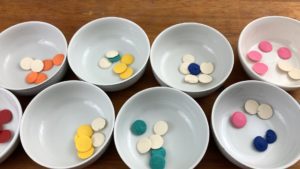
Now you can either warm heavy whipping cream or double cream until bubbles form around the edges and then pour the cream into each bowl, or spoon cold cream into the bowls and put them in the microwave one by one. For drips made with candy melts you need 4 times the candy melts compared to cream, for example 40g of candy melts and 10g of cream.
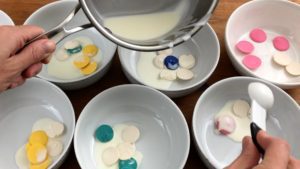
After melting the drips and letting them come to room temperature, do a test drip on the side of the bowl before you move on to your cake. If you’re using white chocolate instead of candy melts, melt 3 parts of white chocolate with 1 part of cream, for example 300g chocolate with 100g cream, and then divide the drip between bowls and add a tiny bit of gel colour on a toothpick to each bowl.
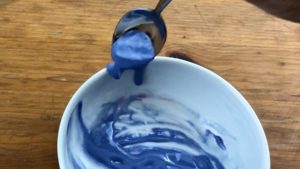
Take your cake out of the fridge and apply the drips with a spoon, scooping up some of the drip and then holding your spoon above the edge fo the cake and angling it to let the drip spill out slowly, moving your spoon around the edge of the cake and pausing wherever you want there to be a drip.
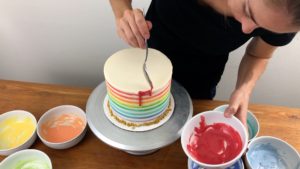
Your cake needs to be cold for this because the coldness of the cake stops the drip from running all the way down to the bottom of the cake. Change colours as you work your way around the cake and ideally all of your drips will be made with the same ratio of cream to chocolate or candy melts, so they’ll all be the same consistency and you’ll get the same drip effect but in lots of different colours.
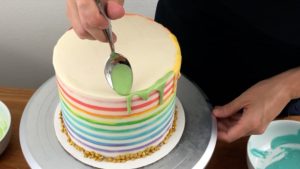
Don’t worry about how neat the edge of the drip is around the edge of the top of the cake because you’re going to cover that up in a moment.
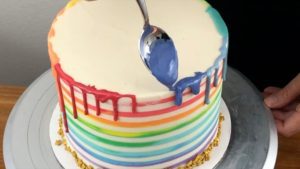
When you finish the drip, pipe swirls or ruffles around the top of the cake with the leftover rainbow buttercream in a piping bag fitted with a Wilton 1M star piping tip. To pipe these ruffles I’m wiggling my bag back and forth so that the buttercream folds over itself.
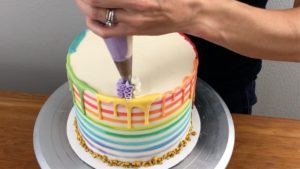
Because I filled one side of the bag with white buttercream and the other half with rainbow buttercream, the ruffles are white on one side and rainbow on the other side. Hold your bag in the same position as you work your way around the cake so that the colours line themselves up the same way for each ruffle.
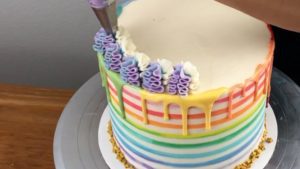
Scatter a few sprinkles on the top of the cake and press a few into the sides in random places, or if you have any smudges on your stripes you can be strategic about where you place the stars so that you cover those up.
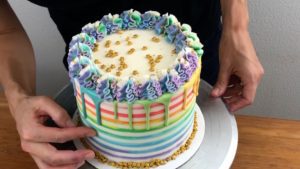
Tadaa! If you’re looking for more rainbow cake designs, check out my tutorial on 10 EPIC Rainbow Cakes.
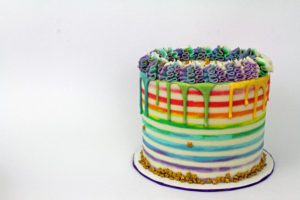
If you make this cake, please tag @britishgirlbakes in your photos on instagram so I can see your creations!
Here’s the video version of this tutorial:
Gold cakes are eye-catching and elegant and in this tutorial I’m going to use three edible gold materials to show you 20 ways to decorate gold cakes! I’ll use 20 different cakes in this tutorial and I have a more detailed tutorial for each one so if you see something you like, click the photo to see that tutorial. If you prefer to watch a video of this tutorial, scroll to the bottom of the page.
I’ll start with some designs using gold luster dust, which is an edible powder that you can use alone or use it to make paint. To make paint, add a few drops of vodka to make quite a thick paint, almost a paste.
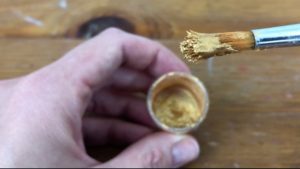
When you lift your paintbrush out of the gold paint you should leave some texture in the paint, otherwise it’s too thin and won’t give you a nice bold colour. You can use a clear extract like lemon extract if you don’t want to use vodka, but it won’t be quite as shiny.
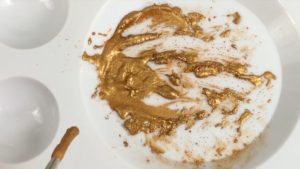
#1 Use gold paint on buttercream frosting by chilling the cake after frosting it, to set the frosting. For this cake I’ve carved a leaf design which I’m painting with a thin paintbrush dipped in edible gold paint made with luster dust and vodka.
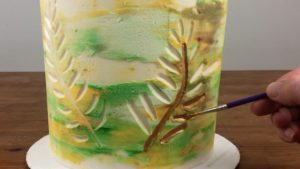
I love painting onto carved buttercream designs because the carved shapes guide your paintbrush so even if you have shaky hands (like me!) you’ll find it easy to stay within the lines.
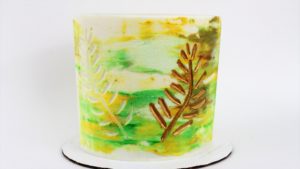
You can paint freestyle onto a cake or trace around a shape with a toothpick to guide you as you paint. I use my 4 Minute Buttercream to frost all of my cakes but for this technique you can use any frosting that set firm, like ganache.
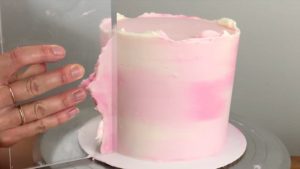
You can apply several coats of gold paint until you get the colour you want. Let each coat dry before you paint the next one so that you layer the gold for the boldest colour. Gold paint dries really quickly as the alcohol evaporates – usually in just a few minutes.
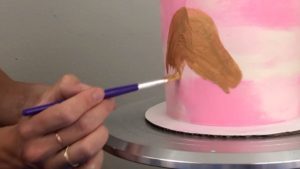
When the gold paint dries you can add whatever details you like, like these pretty flowers piped with Russian tips!
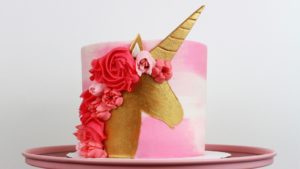
#2 As well as smooth frosting, gold paint works well on textured edges like these piped ruffles on an icing sheet cake. Chill the cake to set the buttercream, which takes about an hour in the fridge, and then use dabbing motions with a paintbrush to create a pretty gold edge. For delicate ruffles like this it’s best to use a thin paintbrush.
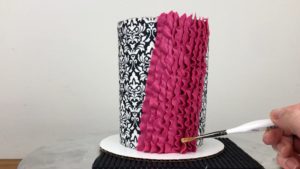
#3 You can also paint the uneven top edge of frosting on a cake. For a wider surface like this top edge, a thicker paintbrush will be much quicker to cover this larger area.
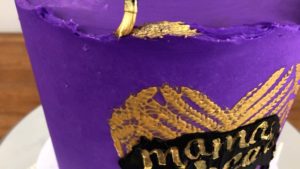
#4 With this technique, everyone will ask you how you made gold buttercream and the answer is surprisingly simple! All you need is a piping bag, a piping tip, and some parchment or wax paper.
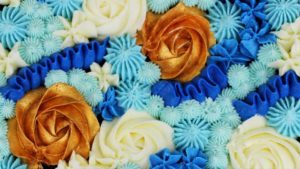
Pipe whatever shape you want onto parchment or wax paper and then freeze it for a few minutes to set the buttercream.
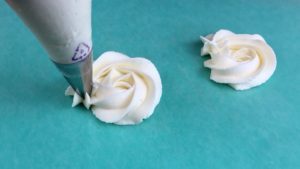
Paint it gold, checking it from every angle to make sure you’ve got into all of the nooks and crannies of the shape. This is quite a slow process but definitely worth it! Chill the buttercream again if it warms up while you’re painting because it needs to be very firm.
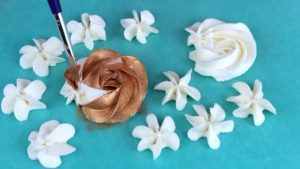
Now pipe a dot of fresh buttercream onto your cake to act as glue. Lift the frozen gold shape off the paper with an
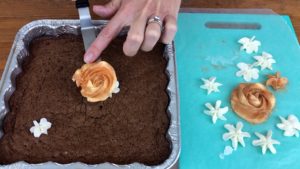
#5 Paint gold onto fresh fruit to add some bling to an otherwise simple cake topper! Dry the fruit completely with a paper towel for the boldest gold results. If the frosting on your cake has set, attach the fruit to your cake with dots of buttercream to act as glue.
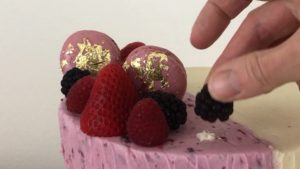
Brush the fruit with gold paint, painting the entire fruit or just parts of it. The gold looks especially nice on textured fruit like berries.
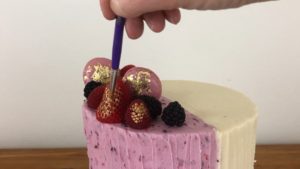
#6 Macarons have been trendy for a while and come in every colour imaginable but a gold macaron on your cake will grab everyone’s attention. Making one is easy – just spin the macaron between your fingers as you paint the sides and the tops of the shells.
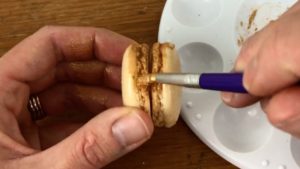
You can also do this before adding filling and pressing the two shells together, just wait until the gold paint dries before you touch it. Painting over a white, yellow or brown macaron is easier than a colour like fuschia or blue.
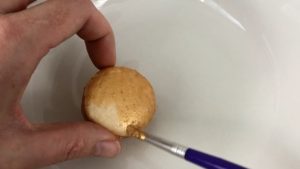
For this cake I combined painted gold with gold leaf, which I’ll cover later in this tutorial, and I think using both types of gold together works really well!
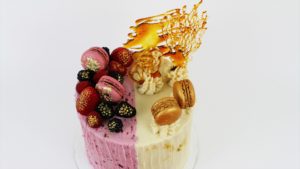
#7 For perfect gold writing on cakes, imprint letters into your cake to spell out your words. This is buttercream frosting, which I chilled for an hour in the fridge so that it was very firm it before doing this.
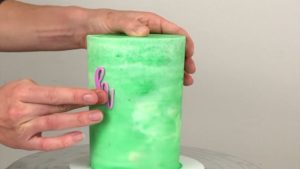
Then use a very thin paintbrush to paint the letters gold. The indented letters help guide your paintbrush to keep the gold within the letters but if you get any smudges outside of the letters, use a clean paintbrush dipped in vodka to brush the smudges off the cake.
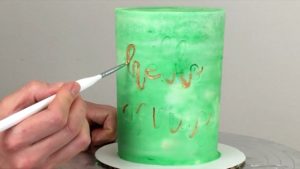
If you’re going to place any other decorations on the cake, like these piped buttercream flowers, I’d suggest doing your lettering first so that you know exactly how much space the writing will take up and then you can use the writing to center your decorations around.
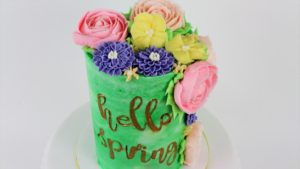
This lettering technique works on smooth frosting but also lightly textured frosting, like this bear which I stenciled onto the cake and then used a spatula to add some random grooves into the frosting like fur.
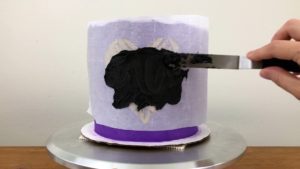
These are Sweet Stamp letters and I like to pick them up by wrapping a piece of tape around my fingers with the sticky side facing outwards.
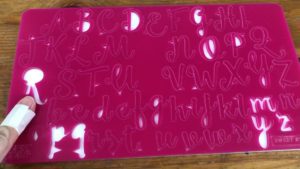
You have to press the letters very firmly into buttercream for this to work. If the buttercream is soft you won’t get neat imprints of the letter so you’ll have to leave it to set for longer.
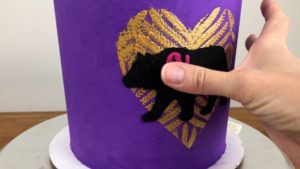
#8 Create gold drips by making ganache using any chocolate – white, milk, or semisweet. If I’m using white chocolate I like to add a tiny amount of brown gel colour to make the drip closer to gold before I start, because you need less gold paint to cover up brown than white.
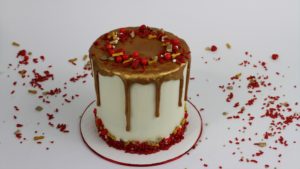
You can apply your drip with a spoon, a condiment bottle, or put it in a ziplock bag and cut off a corner like this.
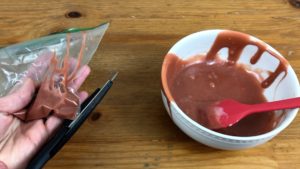
Apply your drip to a cold cake that’s been in the fridge and the coldness will help the drips stop before they go all the way down to the bottom of the cake.
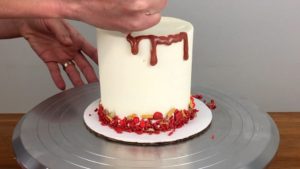
After applying the drip, put the cake back in the fridge to set the ganache drip and when it’s firm, paint it with gold paint. You might need to paint a few layers in some areas to cover the drip completely.When you’ve finished, it will look like you poured something gold straight over the cake!
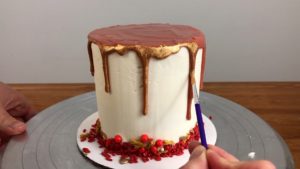
#9 For an unusual drip effect try a marble drip with different colours of ganache swirled with edible gold paint, stirring them together just once or twice so that they don’t blend together. Spoon the drip over the cake, letting it run down the sides.
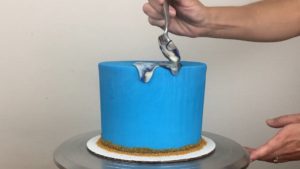
For the top of the cake, drizzle your colours on with a spoon and then spread them as little as possible to cover the top of the cake without blending them together a lot. You’ll be able to see all of the ganache colours in each drip with pretty gold veining from the gold paint.
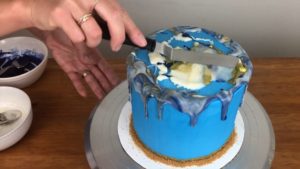
#10 Gold paint works really well for stenciling as long as you secure your stencil to the cake, wrapping it tightly and pinning it in place. If you don’t do this, your design will smudge.
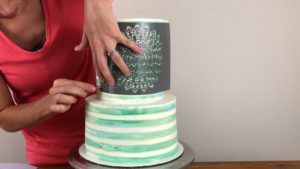
Dab gold paint into the stencil design with a paintbrush or a sponge. Your cake needs to be refrigerated before using a stencil so that the pressure from the stencil doesn’t damage the frosting.
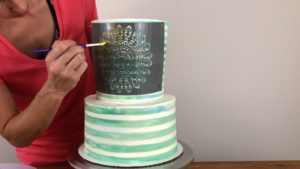
When you peel the stencil off, your gold design will make any frosting classier.
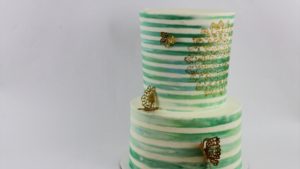
You can use stencils with just luster dust too, without mixing the powder with alcohol to make paint. Brush the dust onto your stencil with a wide powder brush for even coverage (and because it’s quicker than using a small paintbrush!)
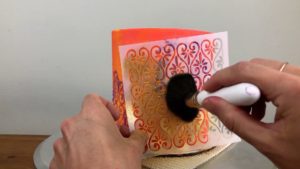
The shimmery gold patterns you create with stencils using gold luster dust are more subtle than when you use edible gold paint but they’re just as eye-catching!
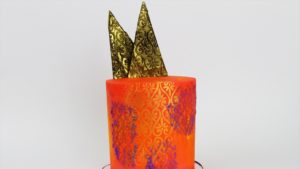
#11 With luster dust you can make golden chocolate spheres to use as toppers to decorate cakes.
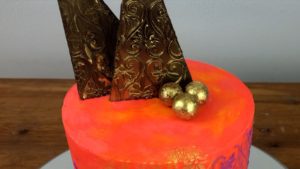
Pour some luster dust into a ziplock bag with any chocolates, like chocolate covered malt balls or truffles with a chocolate coating like Lindt balls, and then shake them around in the bag to coat them with the gold dust.
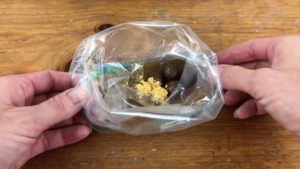
Pick the gold chocolate balls up with gloves to place on your cake so that you don’t wipe the gold dust off with the warmth and natural oiliness of your fingers.
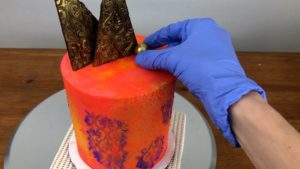
Next, we’ll look at some cakes decorated with edible gold leaf. Gold leaf comes within backing sheets that you peel apart to reveal the edible gold. Make sure you buy edible gold leaf, since you can get gold leaf for decorating all sorts of non-edible art projects too.
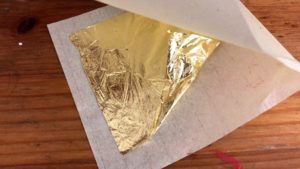
#12 To attach random shaped pieces of gold leaf onto a smooth cake, peel back one of the backing sheets and then press the gold leaf against the cake. It should stick easily but you can press against the other backing sheet to make sure it does.
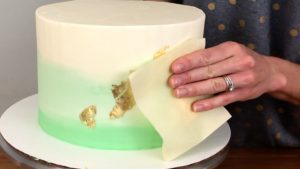
The frosting on your cake needs to have set to do this, because if it’s soft and sticky you’ll almost definitely damage the frosting when you press the gold leaf onto it. Gold leaf makes a simple frosted cake look instantly glamorous!
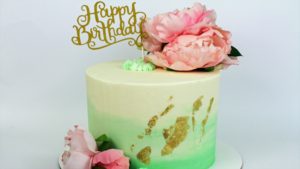
To apply gold leaf to textured frosting you need a bit more control over how much you apply and where you apply it. Instead of transferring it from the backing sheet straight onto the cake, it’s easier to use a paintbrush to pick it up. Because gold leaf is so thin, it’ll stick to your finger if you try to lift it up and then it will be almost impossible to get off your finger to transfer onto the cake.
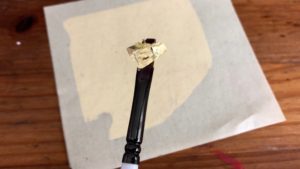
#13 You can apply gold leaf to textured frosting immediately after piping it, touching the frosting gently with the tip of your paintbrush to transfer the gold leaf from the paintbrush onto the frosting. I piped these ruffles with a 1M tip and it’s part of my tutorial on 8 Ways To Use A 1M Piping Tip.
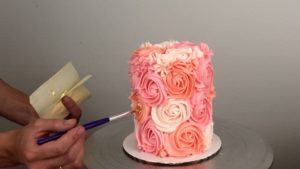
Because the frosting is still sticky, the gold leaf will stick to it easily. You won’t be able to apply any pressure to press it flat against the frosting because you’ll damage the piped frosting by smudging it or it will pull away with your paintbrush.
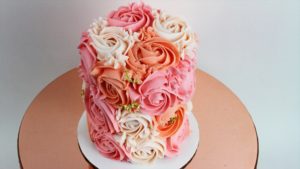
I like to let textured frosting set before adding gold leaf, leaving it in the fridge for about an hour, because when the frosting is hard I can press the gold leaf onto it quite firmly with my paintbrush so that it molds to the texture and lies flat against it.
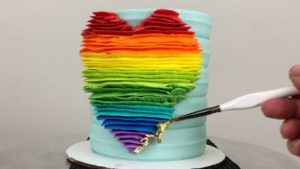
Gold leaf can accentuate or outline any textured frosting. I piped these rainbow ruffles with a petal tip and I share more ways to add texture in 8 Ways To Use A Petal Tip.
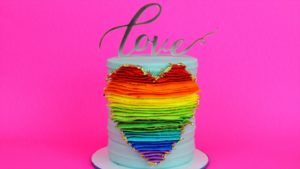
Now for some edible gold cakes decorated with gold sprinkles. Sprinkles add texture and detail to a cake and who doesn’t love a bit of gold bling?
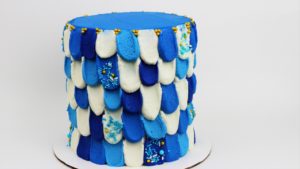
#14 You can press sprinkles into the frosting on a cake individually or in clusters. To attach several at a time, dip your finger into water and shake or tap off the excess so that your finger is damp. Pressing your finger into a bowl of sprinkles and the sprinkles will stick to your finger.
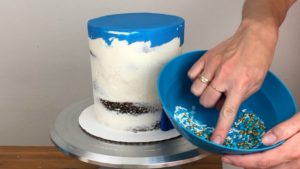
Now press your sprinkled finger into the frosting on your cake. You can do this straight after frosting the cake, while the frosting is still soft and sticky, but you have to be careful you don’t press too hard or knock the cake with a stray finger because you’ll damage the smooth finish.
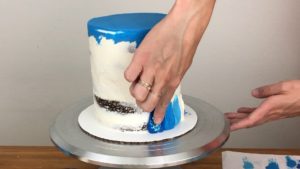
If the frosting has set, like on this cake where the design was made with wrapping paper and for that technique I had to chill the frosting, you can use the same technique with water.
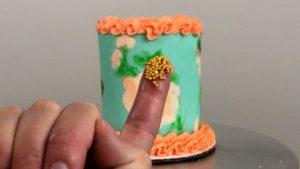
Because the frosting has set and isn’t sticky anymore, you’ll have to use quite a bit of pressure to push the sprinkles into the frosting.
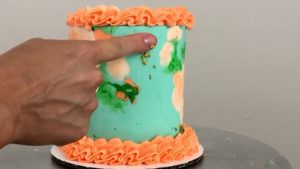
#15 Sprinkles are great for outlining shapes, like this star which I’ve carved out of buttercream frosting on this cake. The frosting has set so I’m brushing the edge of the star with some water to make it sticky.
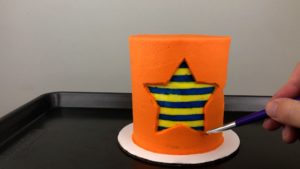
Then you can press some gold sprinkles onto it. You can use your finger after dipping it in water and shaking off the excess water or you can dip a damp paintbrush into sprinkles and then press them onto the cake.
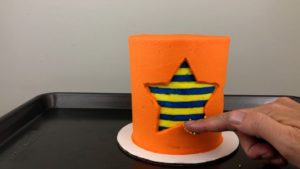
Some larger gold sprinkles make a nice top and bottom border for this cake too!
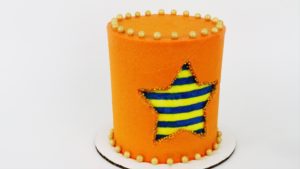
#16 These fancy gold cookies are a unique topper for cakes and they’re so simple to make!
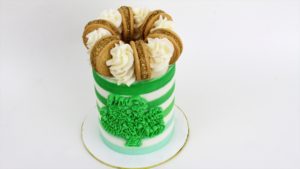
Pull apart cookie sandwiches like Oreos, leaving the filling wherever it ends up because you’re going to cover it up in a minute.
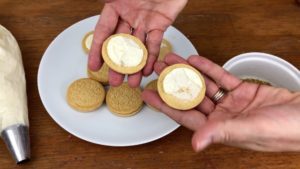
Use a piping bag with a round piping tip and pipe some buttercream onto one half, going around the edges of the filling to cover it up. This is a Wilton #1A but a smaller tip would work as well.
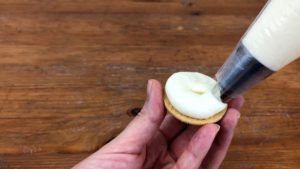
Reattach the cookies and then roll them in edible glitter. The glitter will stick to the frosting you’ve just piped on.
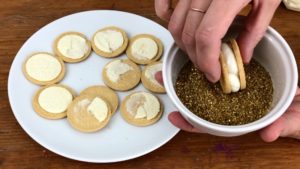
As well as being delicious toppers, the glitter makes these cookies look beautiful, too!
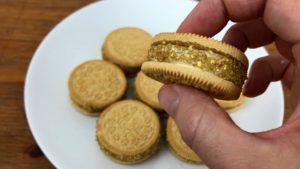
#17 Meringue pops are another delicious cake topper! Get my recipe for them here. Pipe the meringues onto parchment paper and immediately scatter some sprinkles or edible glitter over them, while the meringue is soft and sticky.
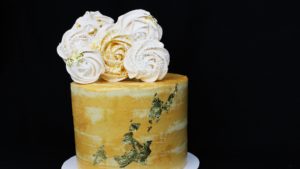
Push cookie sticks into the meringues before you bake them or you can pipe a dot of meringue onto the parchment paper and push a stick into it before piping your meringue swirls over the top of the stick.
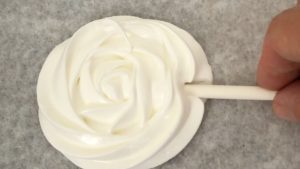
After the meringue pops have baked and cool, push the sticks into your cake! Adding gold leaf to these is a nice touch as well.
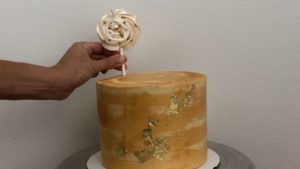
#18 Follow my recipe to make homemade sugar lollipops and pour the cooked sugar mixture onto parchment paper.
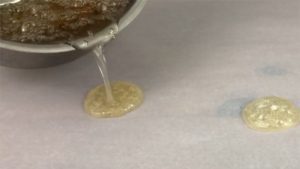
Straight away, before the sugar sets, pour sprinkles on top and push a cookie stick into the sugar.
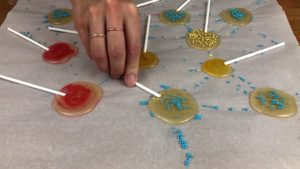
Leave the lollipops for about 30 minutes to cool and harden. Push the sticks into your cake to add height and metallic texture!
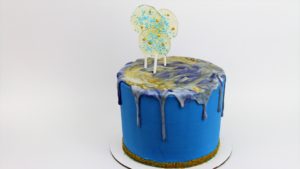
#19 To make gold sprinkled balls, start by coating a chocolate malt ball in melted chocolate to make it sticky.
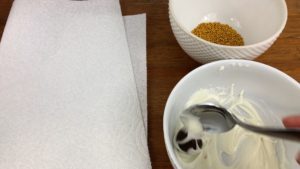
Roll the balls in a bowl of gold sprinkles, moving them around with a spoon to cover them completely. These are tiny nonpareil sprinkles.
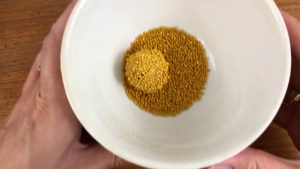
Place them on parchment or wax paper to set and then pipe some swirls of frosting onto your cake and push the sprinkle balls into them to attach them to the cake.
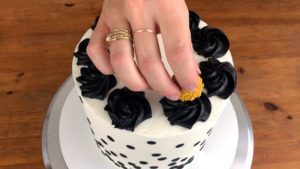
#20 Finally, a gold sprinkle explosion! When you assemble your cake, cut a circle out of the middle of every layer except the top layer. You can use these cut out circles to make mini cakes if you don’t want to waste them.
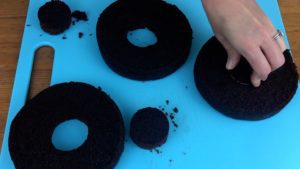
After building your cake except for the final layer, pour sprinkles into the hole in the middle, going right up to the top of the cake, and then place the final layer on top.
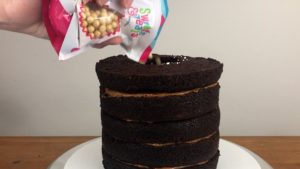
Frost and decorate your cake and when you cut into it, the sprinkles will explode out!
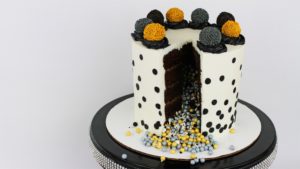
I hope I’ve given your some fun ideas for how to decorate gold cakes and if you try any of these, please tag me @britishgirlbakes in your photos on Instagram so I can see your creations!
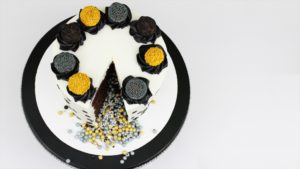
If there are any other ways you’d like to see me use gold on cakes, please tell me in the comments below!
Here’s the video version of this tutorial: